|

|
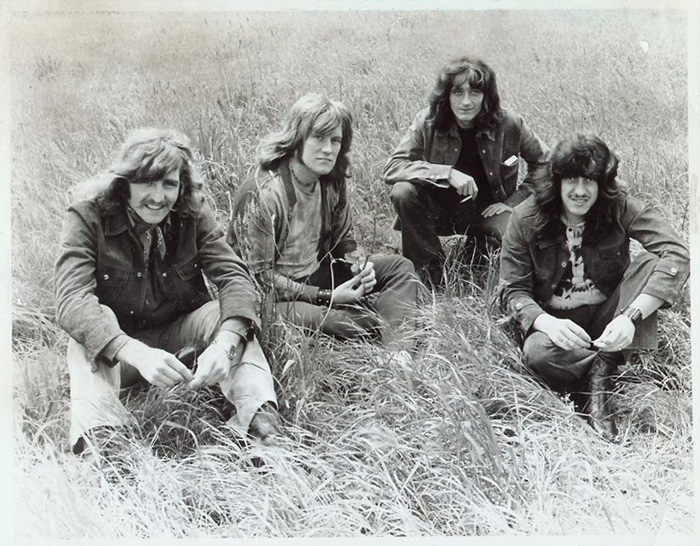
Photographer:
Ed Caraeff
|
Record
Mirror – January 1, 1972

Ten Years
After have been awarded
their first gold disc, for
sales worth in excess of
$1,000,000 for their album,
“A Space In Time”. The group
will make its first tour of
the British University
Circuit since 1969 this
month. The dates are:
Reading January 8th,
Birmingham 13th,
Sheffield 14th,
Lancaster 15th,
Cardiff 19th,
Liverpool 21st,
Leeds 22nd,
Brighton 25th,
Nottingham 27th,
Salford 28th, and
Lancaster 29th.
TYA will be supported by
Jude, a new group formed by
ex-Procol Harum guitarist
Robin Trower and former
Jethro Tull drummer Chris
Bunker, on the dates at
Cardiff, Brighton and
Nottingham. At Sheffield,
Salford and Lancaster,
Supertramp will be the
supporting act.
|
January 1972 - Muziek
Parade magazine
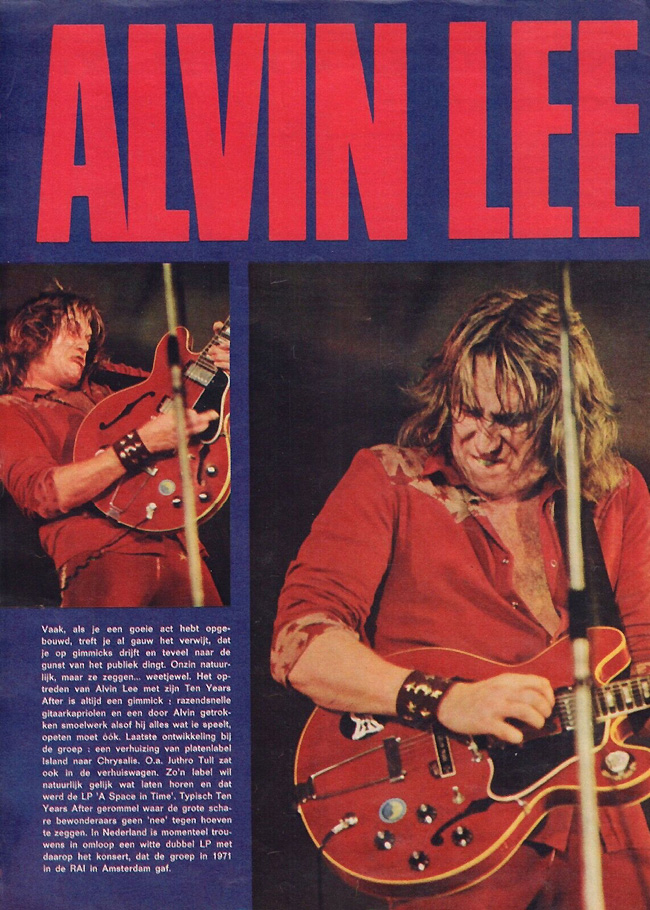
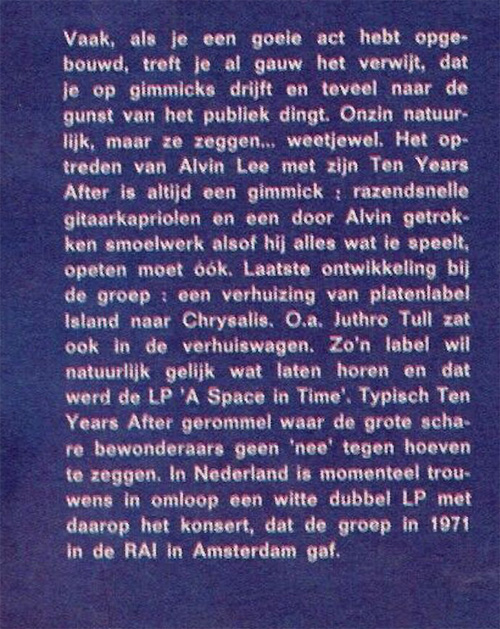
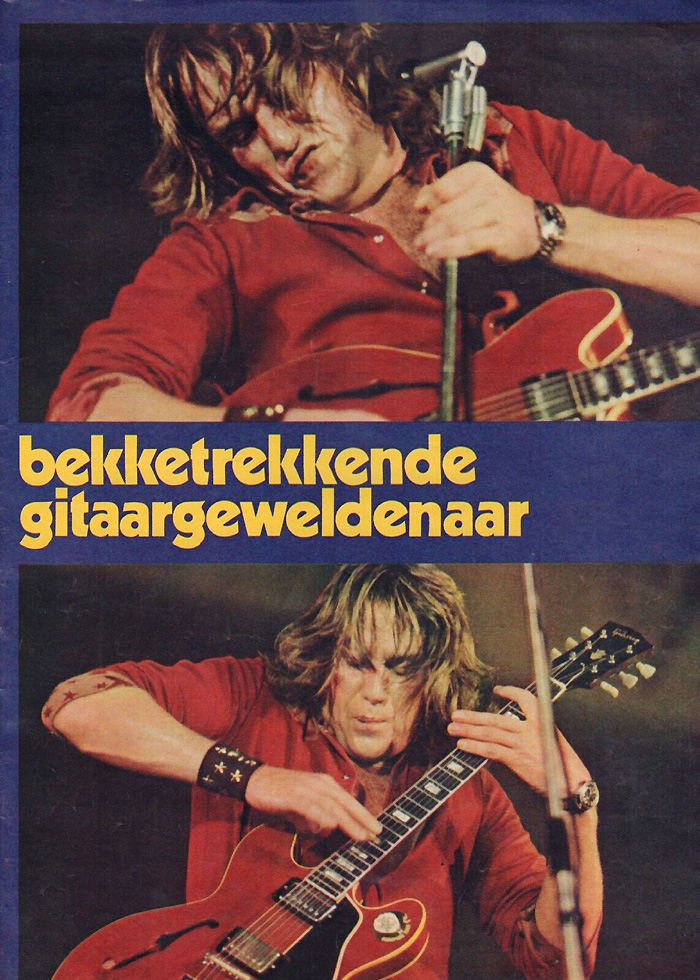
|
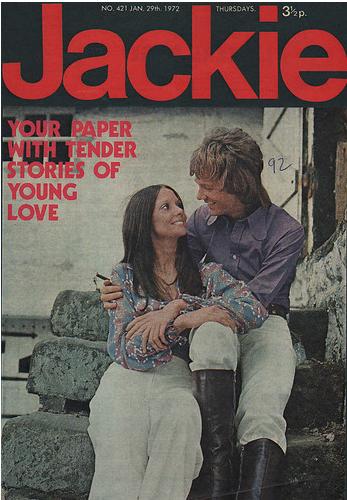
29
January 1972
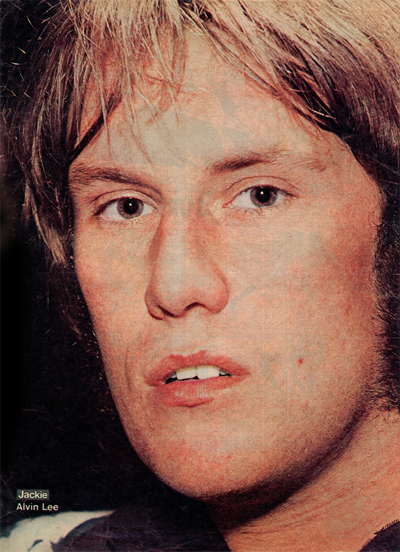
|
|
February 1972 -
Musik Express magazine
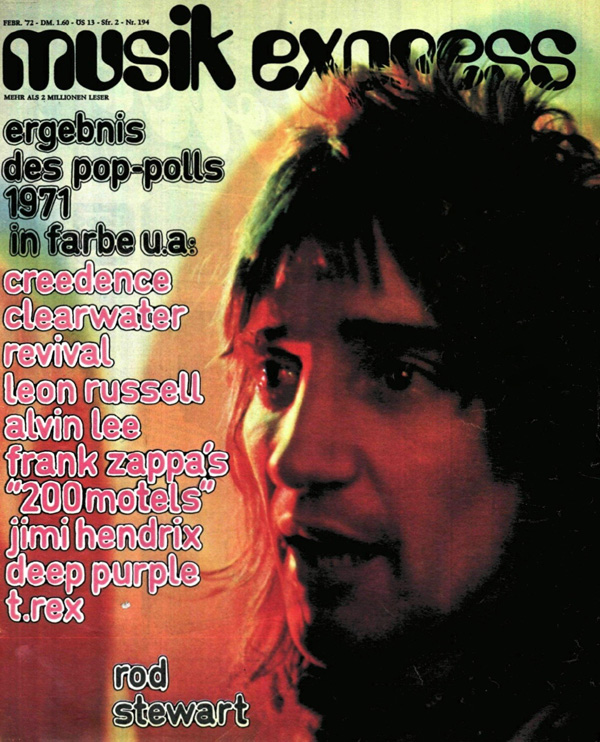
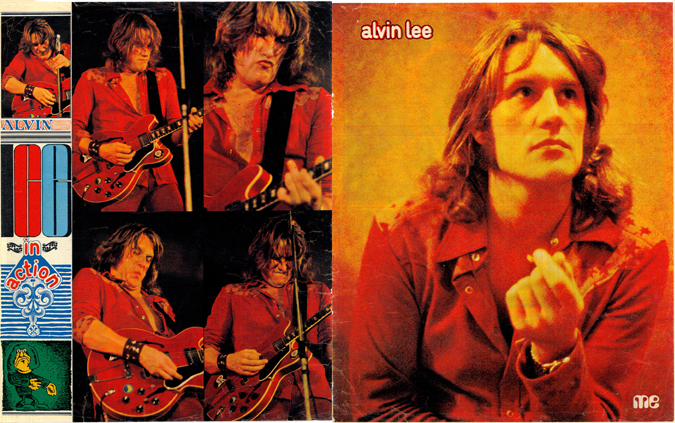
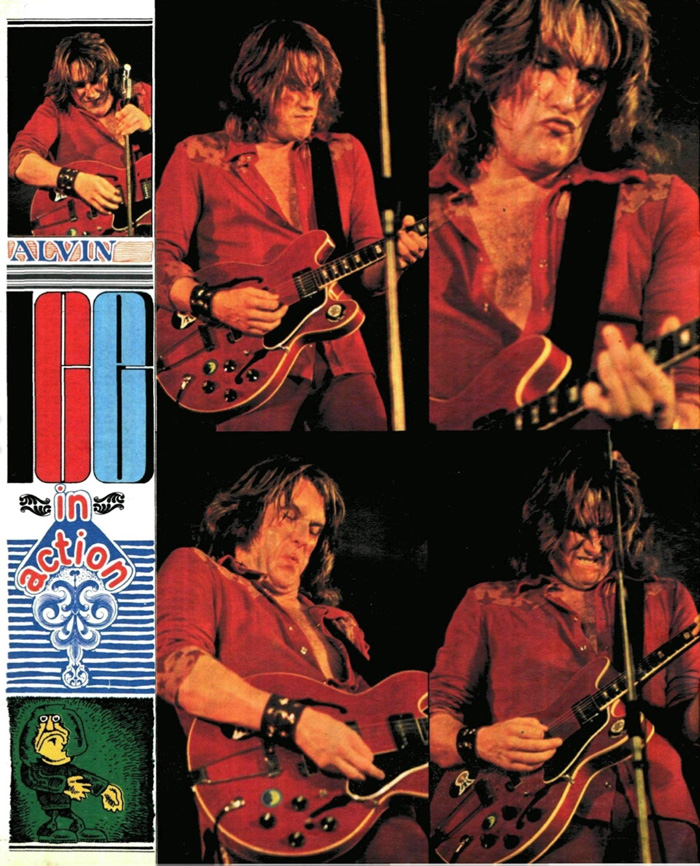
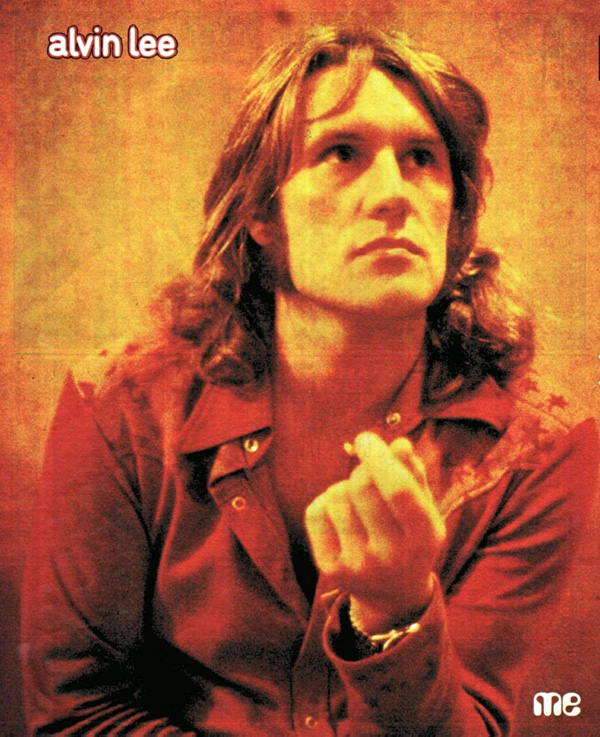
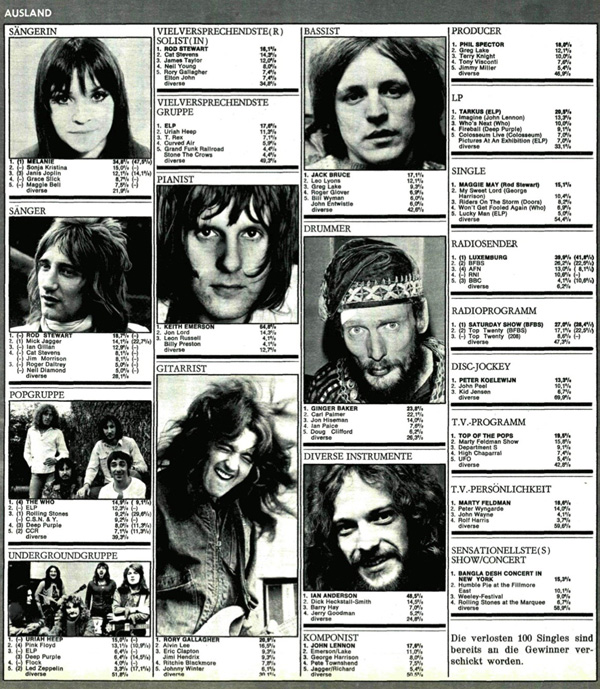
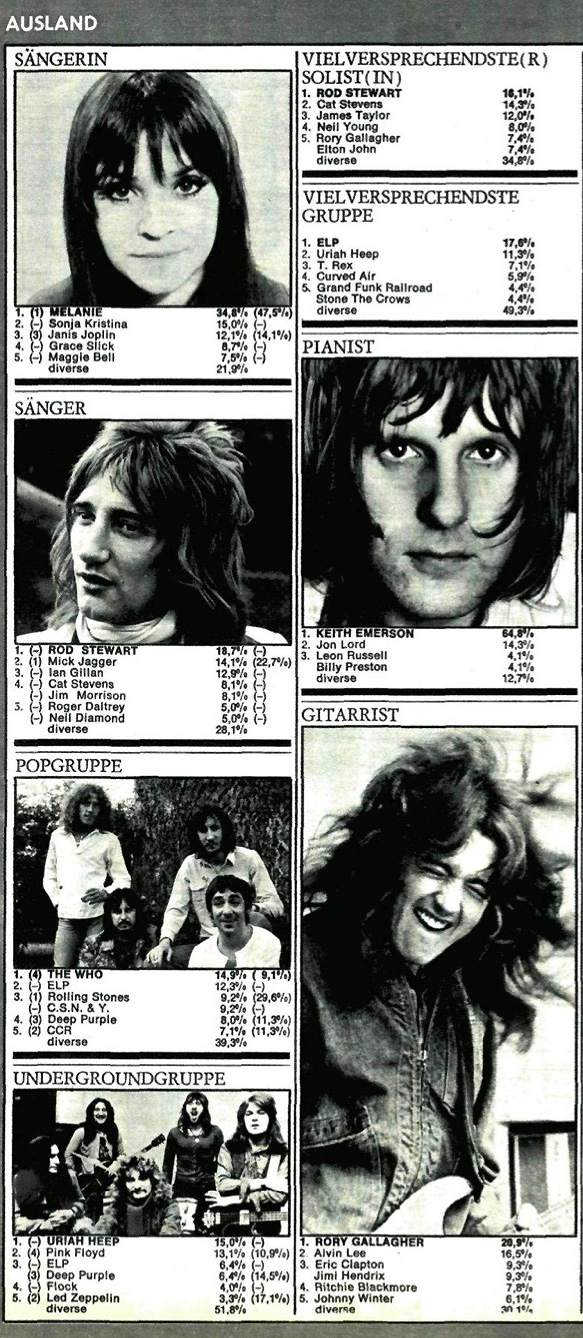
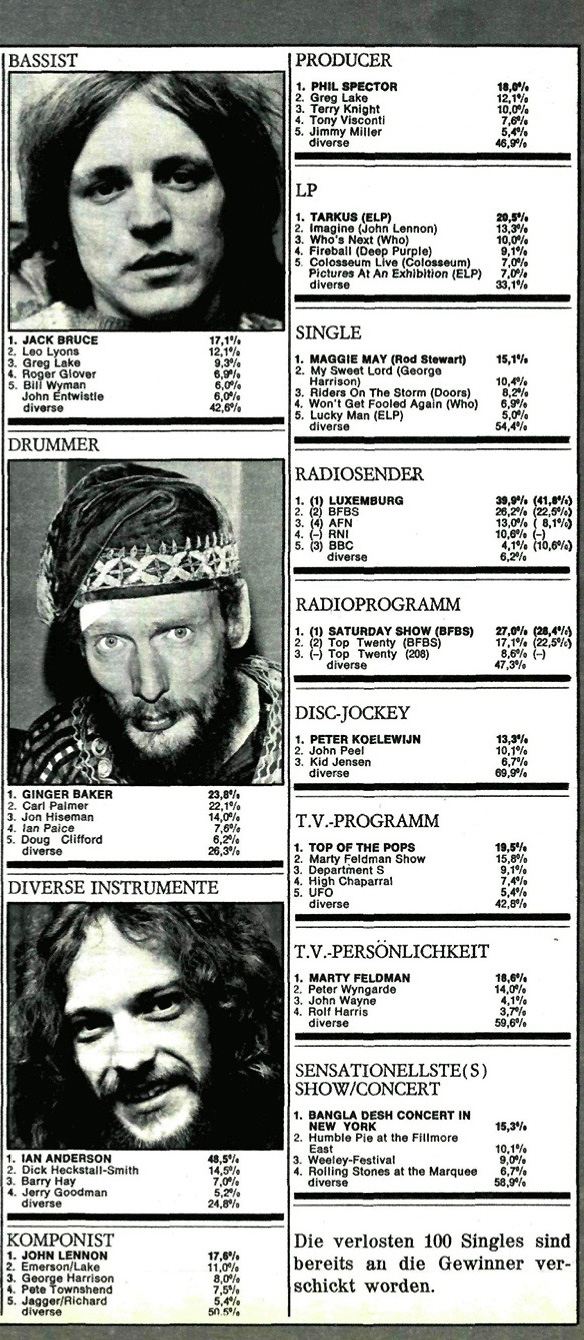
|
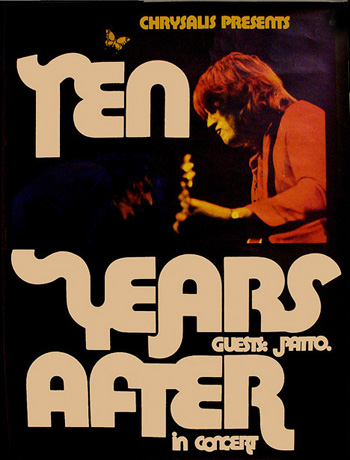
February 1972
“Alvin Lee
and Ten Years After did a tour
of Scandinavia with us
supporting (Patto). On the first
night we played an absolute
perfect set, and not one person
applauded. NOT ONE!
Then Ten
Years After come on, they hadn’t
played for six months. Ric Lee,
their drummer was so rusty, it
was unbelievable. It was like
Sweep playing the drums, with
Sooty on the magic organ! And
the audience went crazy. It made
me wonder, what it was all
about…certainly not about going
on and playing well. Anyway,
Alvin Lee couldn’t believe how
sensational and extraordinary
Ollie Halsall, our guitarist
was. He’d never heard him
before, and he absolutely
flipped. So he got a Revox tape
recorder, and recorded every
single Patto gig on the tour.
Alvin even used to travel from
gig to gig in our van. He just
wanted to be with Ollie”.
From John Halsey - Patto’s drummer
24 February 1972 - Stockholm,
Sweden
3 March 1972 - Berlin, Germany
|
Danish
Magazine "vi unge" February
1972
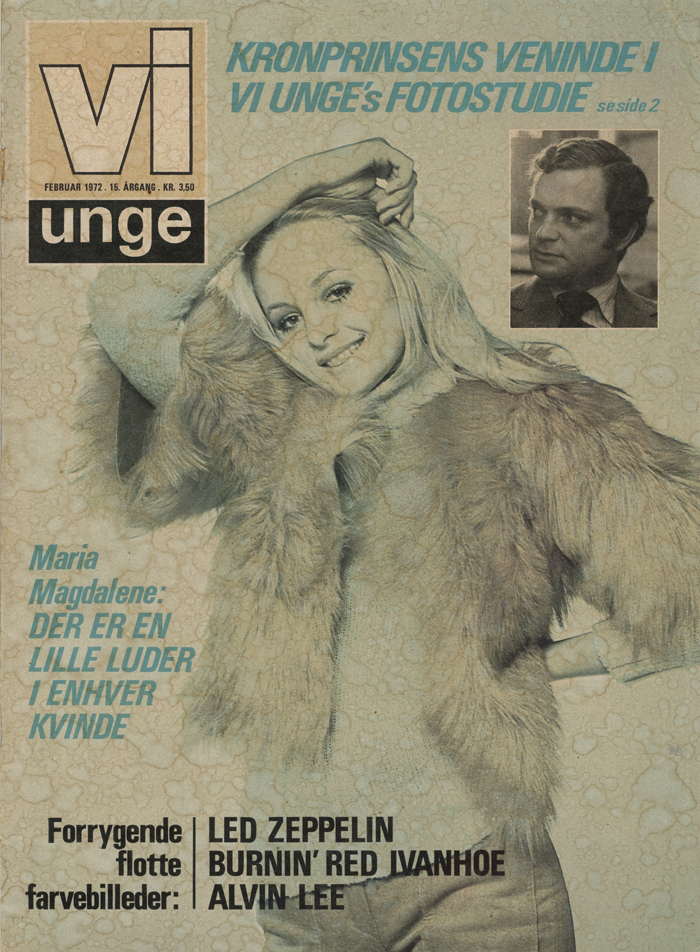
Front
Page
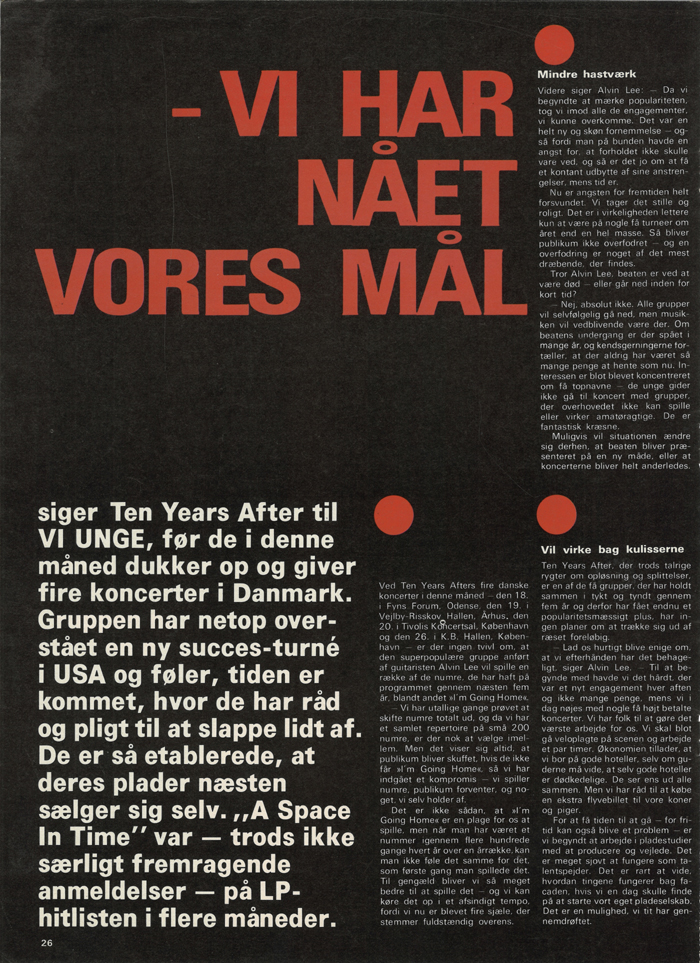
Page 26
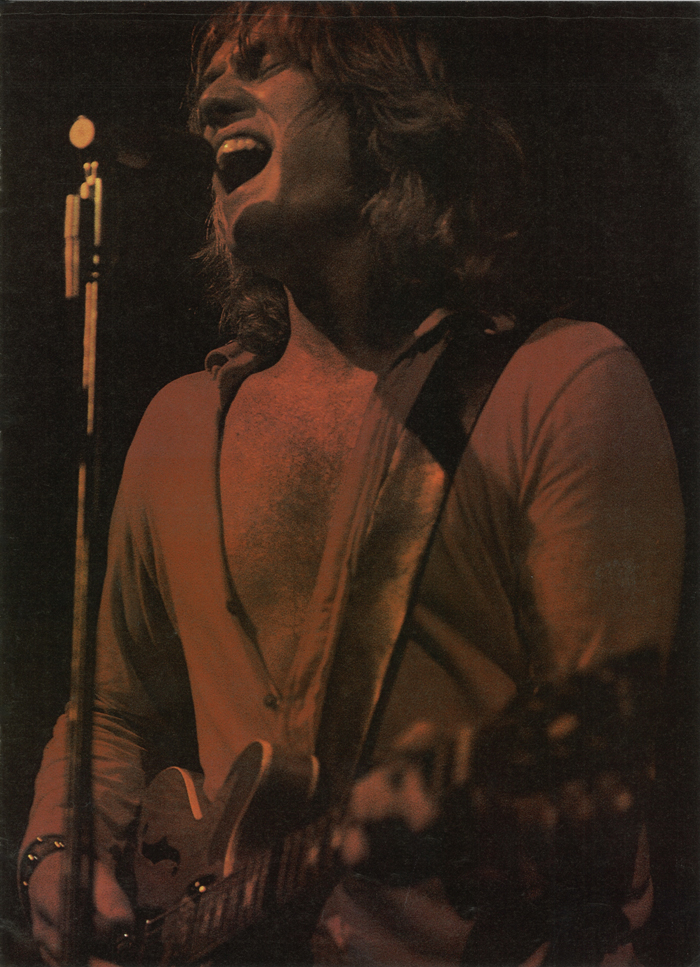
Page 27
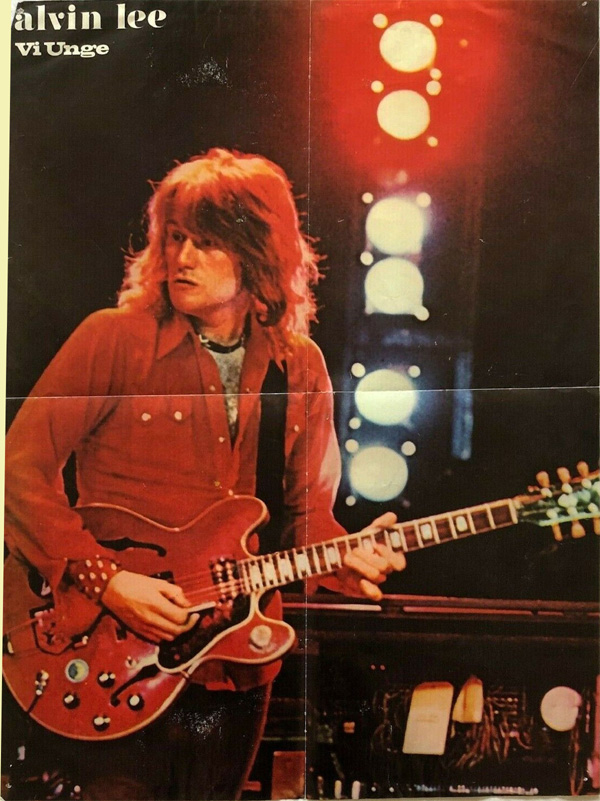
Poster,
Danish Magazine "vi unge"
|
|

|
TEN YEARS AFTER
in Düsseldorf, Germany
5.3.1972
Photos
taken by
Hans
Hübner
Courtesy of
B & D
9.
März 1972
Münster
Brigitte's
original ticket
DM 9,50
|
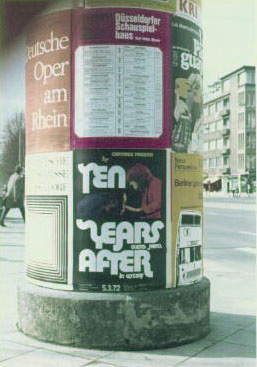
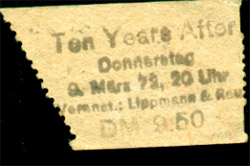
|
|
The following
photos were taken by Hans Hübner - 5 March 1972 at
Philipshalle Düsseldorf
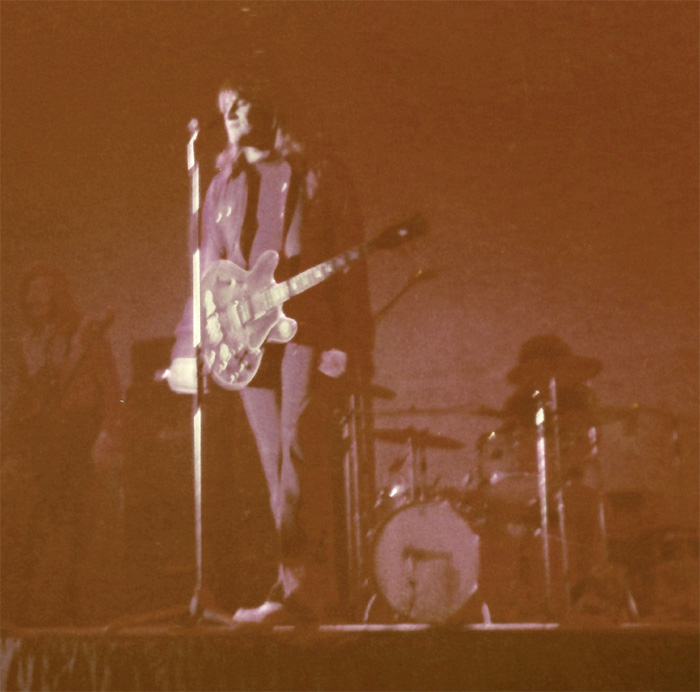
Photographer:
Hans Hübner
|
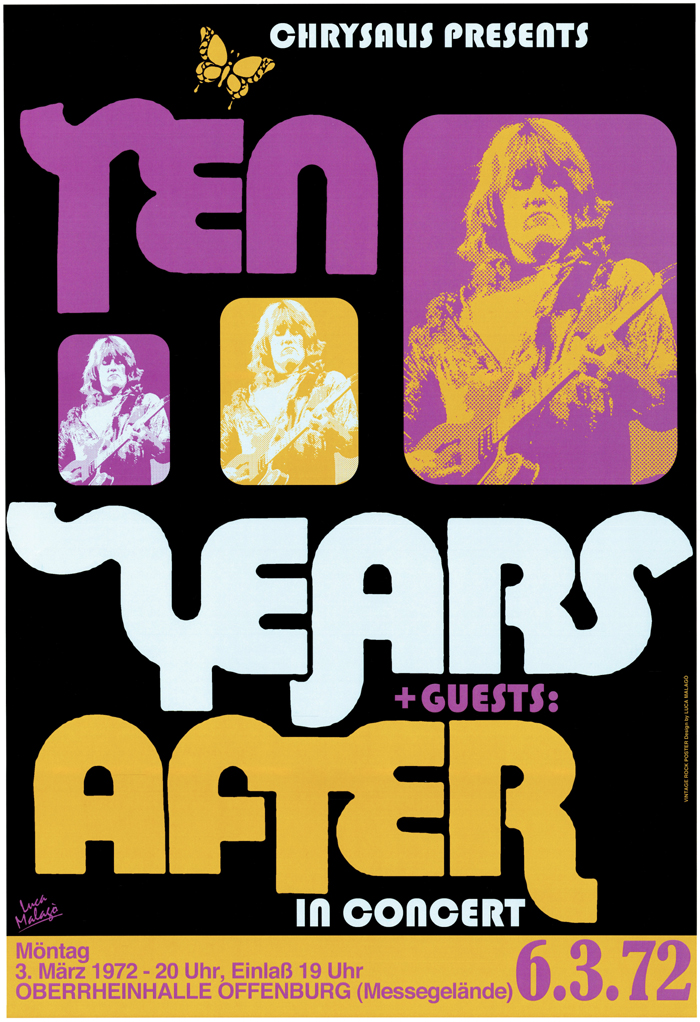
March 6, 1972 -
Offenburg, Oberrheinhalle,
Germany
Tribute
Concert Poster by Luca Malago
from Italy
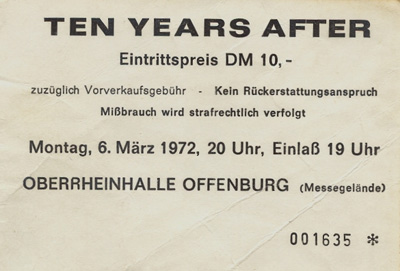
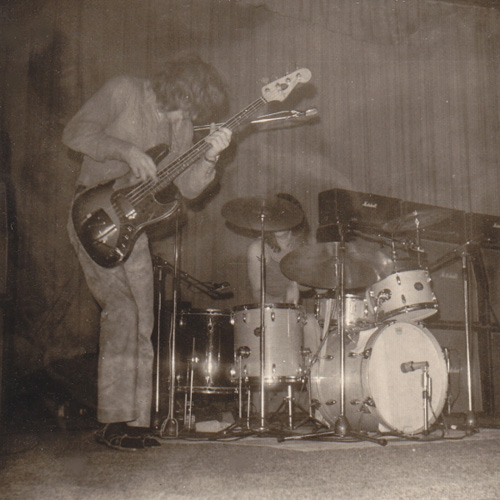
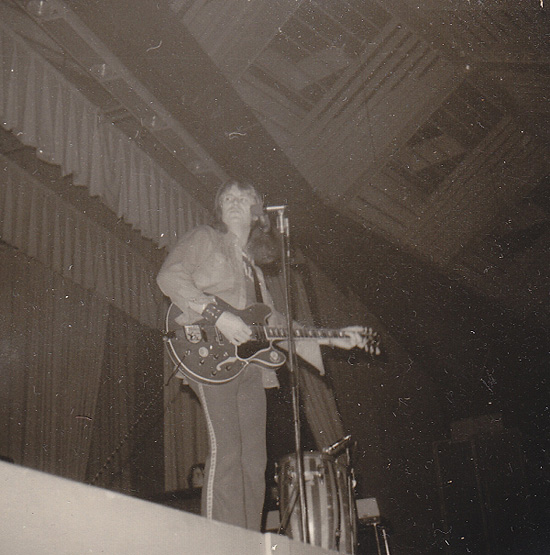
6 March 1972 - Offenburg
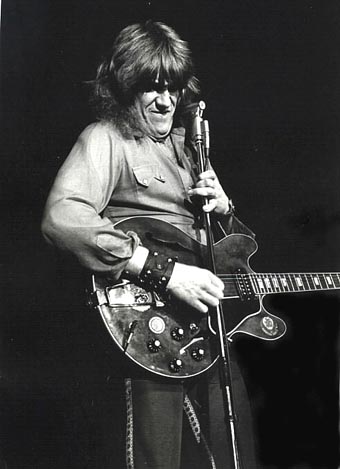
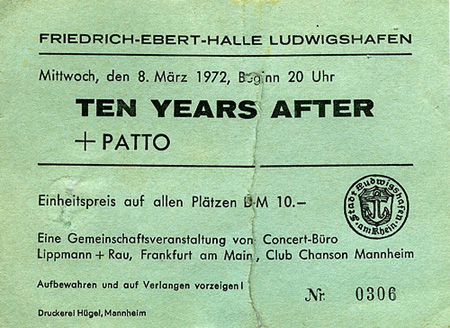
|
|
11 March, 1972 -
pep Magazine Cover, Holland
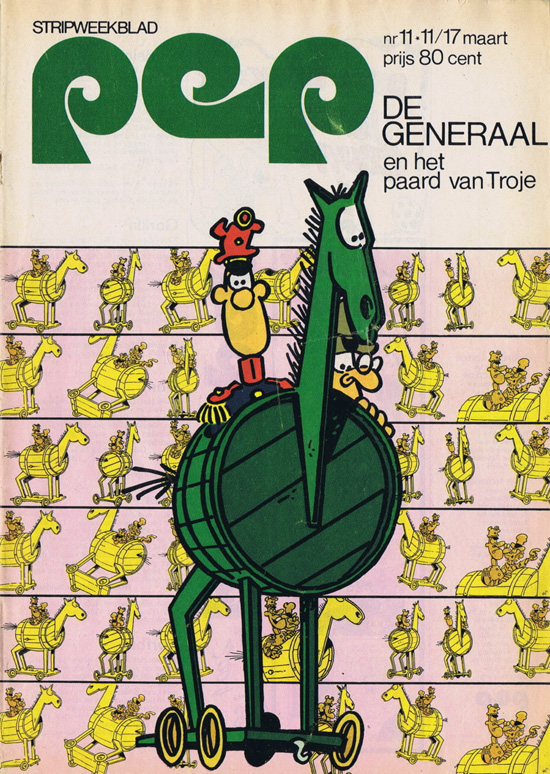
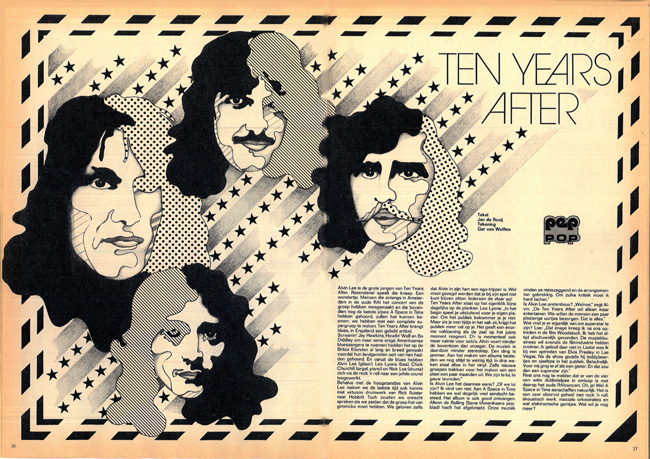
|
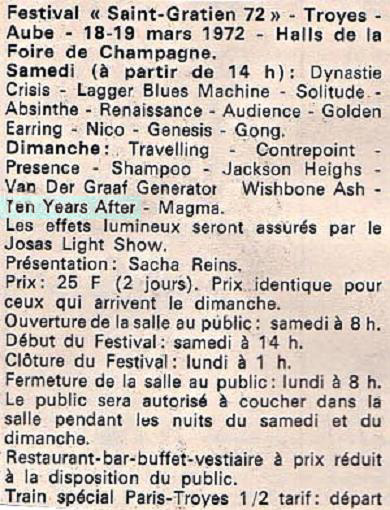
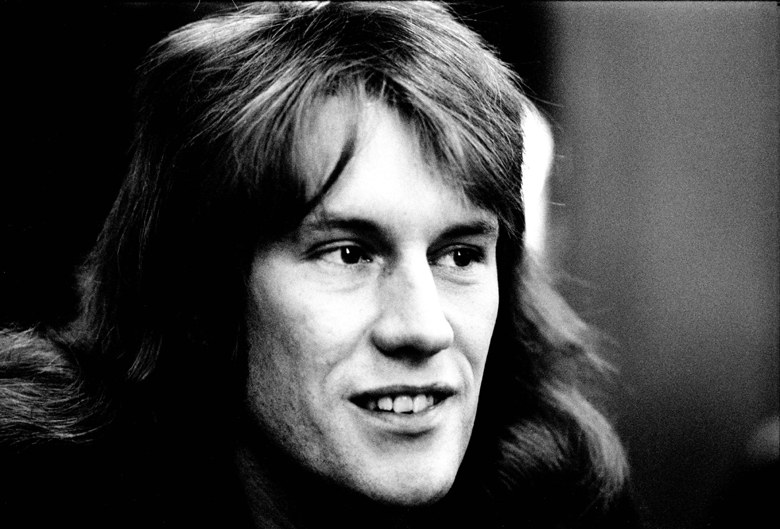
March 1972 - Alvin Lee
Portraits by Gijsbert Hanekroot - Netherlands
https://gijsberthanekroot.com/
- licensed from Alamy -
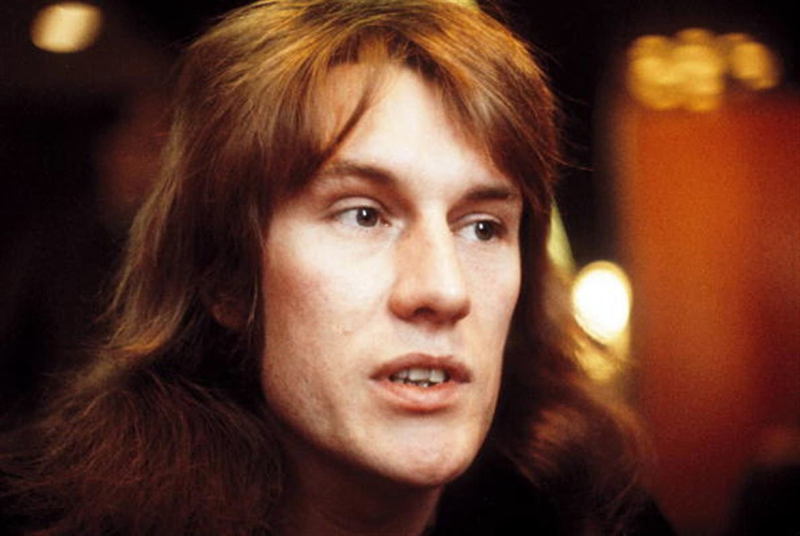
24 March 1972 - Ahoy
Hall, Rotterdam, The Netherlands
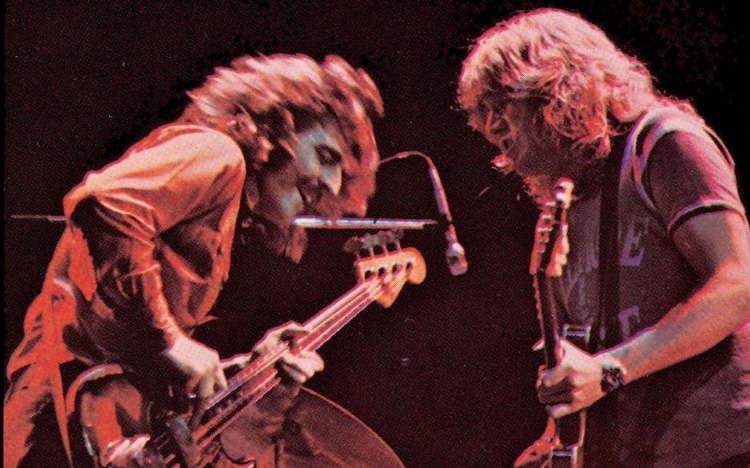
Leo Lyons & Alvin Lee
Photographer: Frans Verpoorten
25 March 1972 -
Forest National, Brussels
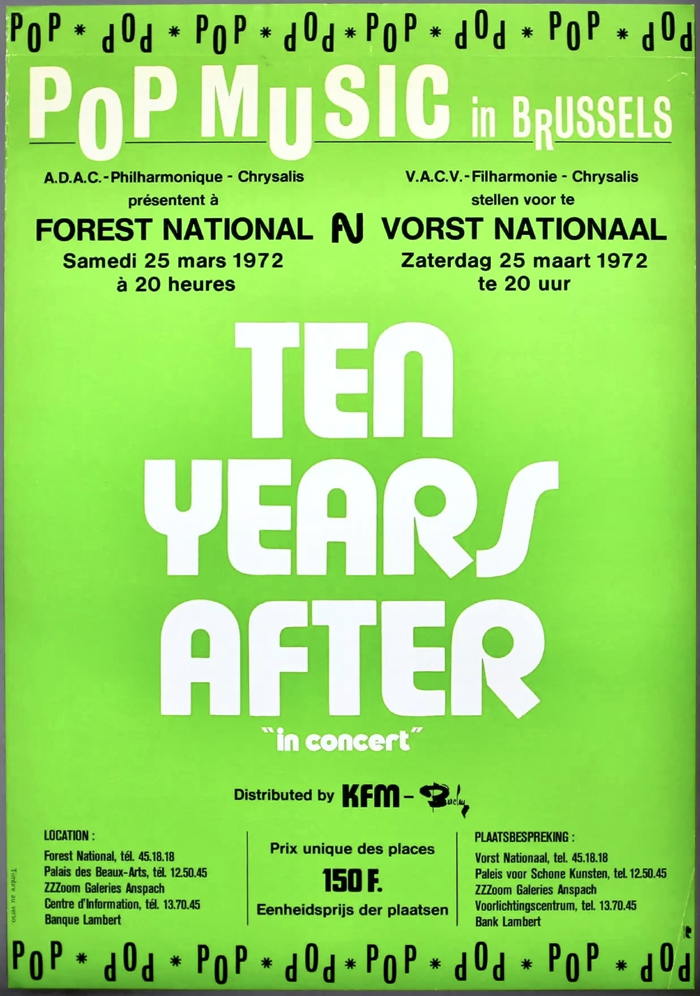
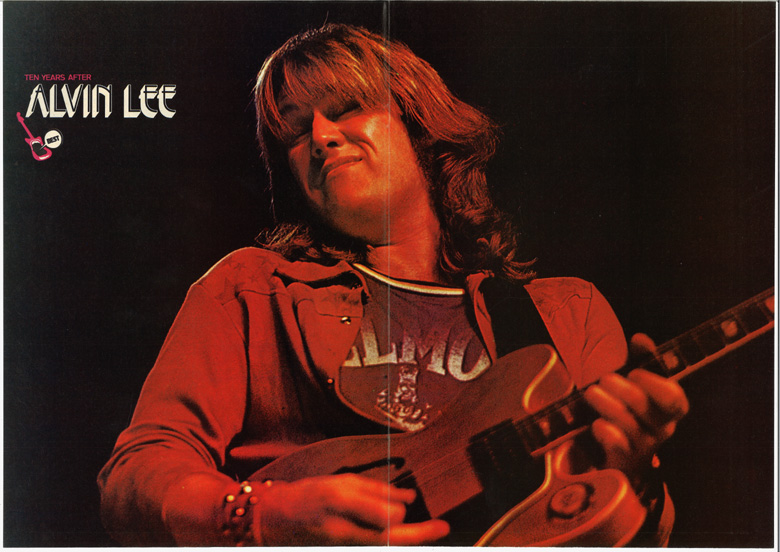
Photographer: Jean-Yves Legras
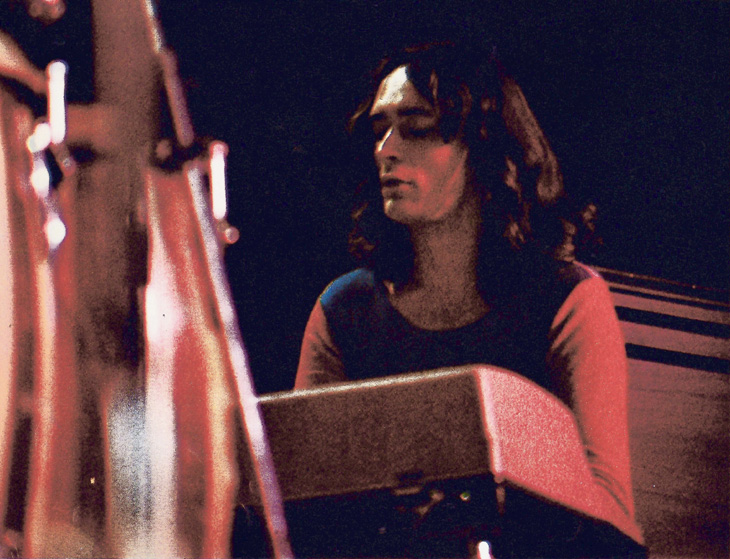
Photographer: Claude Gassian
|
DISC
- March 25, 1972
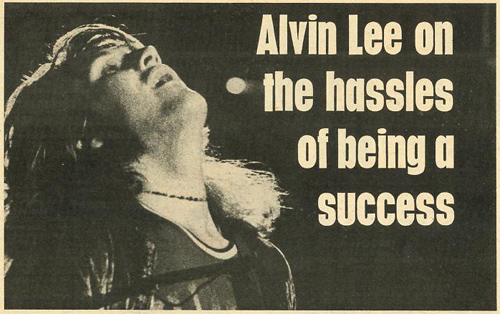
“Alvin Lee on the Hassles of Being a Success”
Alvin Lee is currently suffering from a surfeit of
everything. He’s had too much touring, too much hype,
too much idolatry. Nowadays the band can’t play without
being drowned by screaming or a constant barrage of blue
flash bulbs from photographers. They’re hounded at
airports and their records are bootlegged.
“As a band we were always thinking, perhaps we were
being successful and achieving something, but this is
the first year we’ve felt we’ve actually done it to some
degree. Before we were still kind of struggling to
control what we were doing, and now it’s settled down.
Tours come easily; the music changes, it’s almost boring
because nobody’s struggling any more. “I used to enjoy
the days when we’d get into the van together and sit in
it for five hours, our heads were much more together
then. Now there’s no hassle and you have a clockwork
schedule to follow, and a tour is run like a
campaign. It completely does away with that feeling of
companionship.”
Alvin is talking at his large Berkshire home. It is
homely and comfortable, with lots of bric-a-brac
gathered on tours. One room is devoted to his
photography and filming, a passionate hobby, which seems
to be fast overtaking the music, with a screen that
pulls down from the ceiling, and lots of big cushions
sprawled on the floor for happy viewing.
I Want To Make A Film
He runs through some excellent slides he’s taken in
America, France and here and there. He undoubtedly has
photographic talent, and is still very proud of the
article a photographic magazine did on him. We also
listen to some tapes of numbers for the next album,
which the band recorded in France recently, using the
“Rolling Stones” mobile unit. They have captured a raw,
driving bite not often heard offstage, with some
beautiful rock and blues numbers. They hired a chateau
to record in and used the vast marble hall so the drums
have a metallic bounce, and the organ echoes off into
the distance. Alvin was amazed at how much was due to
the unit, and how much to its psychological effect.
“Another drag about being successful,” says Alvin, “is
having to record out of the country to avoid tax. I wish
it would all be logical and straightforward, but instead
you get more and more into sympathy with Ray Davies
singing about the taxman taking all his dough. “It’s
unfair anyway because you’ve got ten years maximum in
this job, unless you want to go on and do cabaret work,
and there’s no way I’m going to be doing that. I want to
get into producing and recording; I want to make a film.
There’s so many things I want to do, it’s like standing
at a multi-crossroads.” Before we go any further, let it
be stressed, that this doesn’t in any way mean Ten Years
After will split. A group that has been together for as
long, and through as much as they have, doesn’t just
cave in overnight. Alvin is merely taking stock of his
thoughts; pausing before starting their thirteenth tour
of America. Since the hoo-hah following Woodstock, the
posters, the superstar treatment that Alvin got, which
he didn’t want, he’s obviously been doing a lot of
thinking, which has left him feeling rather wistful and
nostalgic for the pre-success days.
“We just wanted musical success really, the money is
great when you earn it, it allows you to put things back
into what you’re doing. Before we were just starving to
do well, we were so hell-bent on getting through, we
would work every night we could. When we did make it, we
had so much work coming in, we were on our knees, and
not daring to turn any of it down.”
“You see, we need to reach beyond our capabilities, and
now we come to the point where, are we best to reach a
bit further, or are we best to play the things we’re
doing well? We’re going to try and do some stock old
blues things, and see how that comes out, integrated
with other live things. The band isn’t the kind of band
that can just play in a studio. “The Beatles reached out
in the studio, and didn’t play live at all, and a lot of
bands are doing more studio than live things now, but
we’ve always been more of a live band, and you get a
feedback from an audience, which keeps you in touch, and
stops you going out on a limb. “But concerts, in some
places become more and more difficult. In Germany
recently, there were fifty photographers out in front
with flash bulbs going the whole time. It was terrible
for us, and terrible for the audience. I stopped playing
and got somebody to come onstage and tell them to stop
in German, but they all started up again three minutes
later. And once you begin to notice the hassles, it’s a
psychological thing, and it gets worse, like at Madison
Square Gardens, about two percent kept quiet.
English Tours Are Fantastic
“English tours are fantastic because they just sit and
listen, we want to do more in England, but the
commercial aspects mean you have to play the bigger
places, abroad as well, and of course the places where
the money is, there’s thousands of people pushing and
shoving and screaming, and you feel like a circus
freak.” Alvin now realises the need for him to get into
other things for relaxation, and diversification,
otherwise his music will suffer. “I need to diversify my
interest, I’m so wrapped up in music, I just get
technically involved and bogged down. The music I enjoy
playing now on my own is virtually Music. I need a fresh
outlook, something I can get into.”
Alvin has wanted to make a film for some time. He wanted
to take a camera and sound crew on the road with the
band some years back, and make a film about touring, but
then “200 Motels” came out, and said more or less
everything he wanted to. Alvin also wants to produce a
group, although he realises the irony of the situation,
as he himself is terribly anti-producers.
“I would never use one because I believe a true musician
is the only person to produce the music on record. Lots
of producers will say, “Oh, we’ll make that bass a bit
more like James Brown.” But my ideals about music seem
to be less and less important.
But to produce a group properly, I must be completely
into their music, and respect them.”
|
Alvin also despairs of the music that is selling in
these days. Ten Years After struggled for years unheard,
but playing the music they loved, and believed in. “But
now, you get bands playing so-called progressive things
because it’s the thing to play, and it’s gone very
shallow. I get sad when I hear all this middle of the
road stuff too, because it will mean that everything we
struggled for musically, over the past four years,
everything the under-ground brought over-ground, will
slip away and mean nothing, and more serious music won’t
have got a hold.”
Alvin also wants to do some more electronic music, which
he experiments with endlessly at home. He won’t use a
Moog, because he reckons that’s cheating, but fiddles
around with microphones on brass plates, and echo
effects. He’s got hours of tape, and is considering
giving it to somebody to put out if they’re interested.
!I mostly write things for the band, but what we put out
is an amalgamation of all of us, so for every one number
of mine we do, there’s eight the others haven’t liked,
that I’ve still got on tape. I’m not saying they’re
fantastic, but they’re a lot better than some things
I’ve heard that people have put out.”
Article written by Caroline Boucher
|
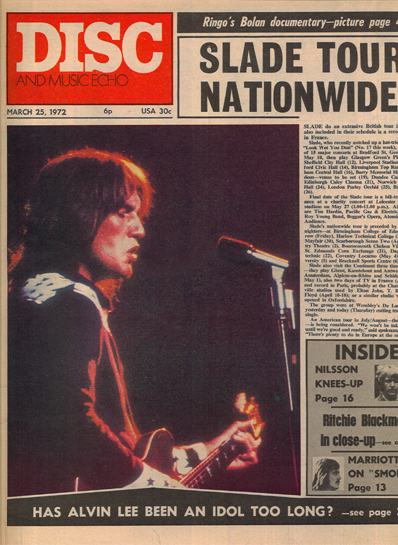 |
|
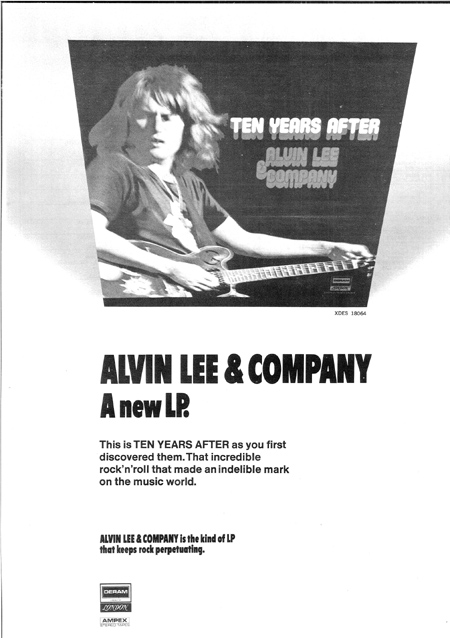
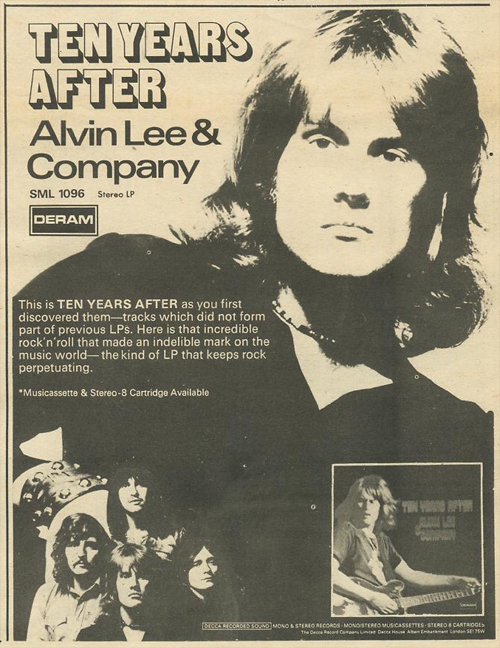
|
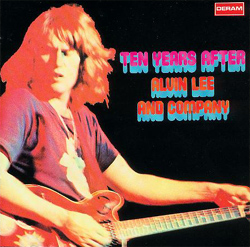
Ten Years After - Alvin Lee & Company (Deram
Records)
This LP, is a compilation of previously unreleased
material recorded prior to their label switch, (To
Chryalis Records) would
seem to be comprised of mainly throw-away cuts which is
definitely not the case. The material is easily as
exciting and diverse as that exhibited on their “Space
In Time” LP. (1971 – Columbia Records)
Alvin Lee again establishes that he is a consummate
guitarist, his licks irresistibly insistent. Check out –
“The Sounds” – “Boogie On” and “Portable People”.
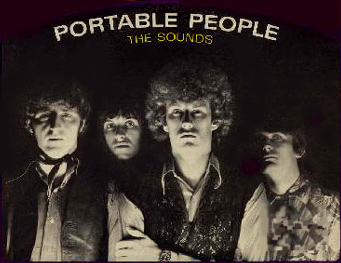

|
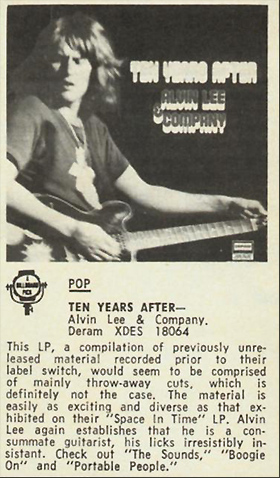
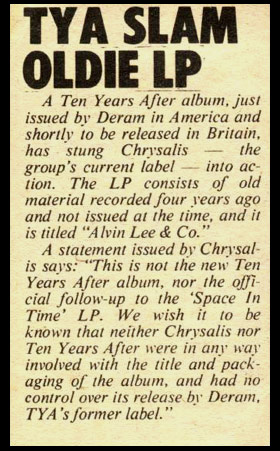
New
Musical Express April 1, 1972 |
|
Ten Years After –
"Alvin Lee & Company" 1972
This is a
collection of songs that didn’t make it onto the
studio albums during the 1967-1969 period. The
original album features six tracks, the last one being
a mini-jam-session called, “Boogie On”, which uses up
as much running time as the other five combined. The
jam evolves around a simple riff, that’s played over
and over and from time to time being interrupted by
Chick Churchill’s organ, Ric Lee’s drums, Leo Lyon’s
bass and Alvin Lee’s guitar solos, that feature all of
the usual aural gimmicks. However, the first five
songs on the first side are a totally different
matter. Plain old boogie-woogie songs, represented by,
“Rock Your Mama” and “Hold Me Tight”. Then there’s
some old blues with the Robert Johnson classic,
“Standing At The Crossroads”, then a simple sounding
bluegrass shuffle called, “Portable People”. It’s only
“The Sounds” that comes across as an “experimental”
piece, complete with the obligatory synth effects with
a grim and desperate mood.
These
out-takes all fit into the criteria of “Good but not
Perfect” category, as each one of them shows distinct
flaws, which make it understandable exactly why they
never made it onto the official studio albums in the
first place. They come across as exactly what they
are, generic, underdeveloped and inferior to other
similar ones. The reason being, these tracks were
never intended to be released in the first place, the
Decca Record Company high jacked
Ten Years
After’s unfinished work, when the band decided
to change record companies, and that’s how this
release came about. To cash in on the bands current
success.
By Gene
Herbert CA.
|
|
Ten Years After – “Alvin Lee and Company” - 1972
This originally surfaced as a six-track retrospective
in 1972, after the band left Decca for Chrysalis. It
now includes three extra cuts, the seven-minute blues
B-side, “Spider In My Web”, and the mono-only single
edits of two of their most famous tracks, “Hear Me
Calling” and “I’m Going Home”.
The original album was dominated by the fifteen-minute
“Stonedhenge” out-take, “Boogie On”, which is exactly
the way it sounds. The 1968 export single “Rock Your
Mama” and “Hold Me Tight” are in a similar vein, while
the live “Crossroads” isn’t very exciting.
More worthwhile are the brooding “The Sounds”, which
opens the CD,
and the 1968 A-side “Portable People”, which belongs in
the same distinguished company as Canned Heat singles like
“On The Road Again”.
|
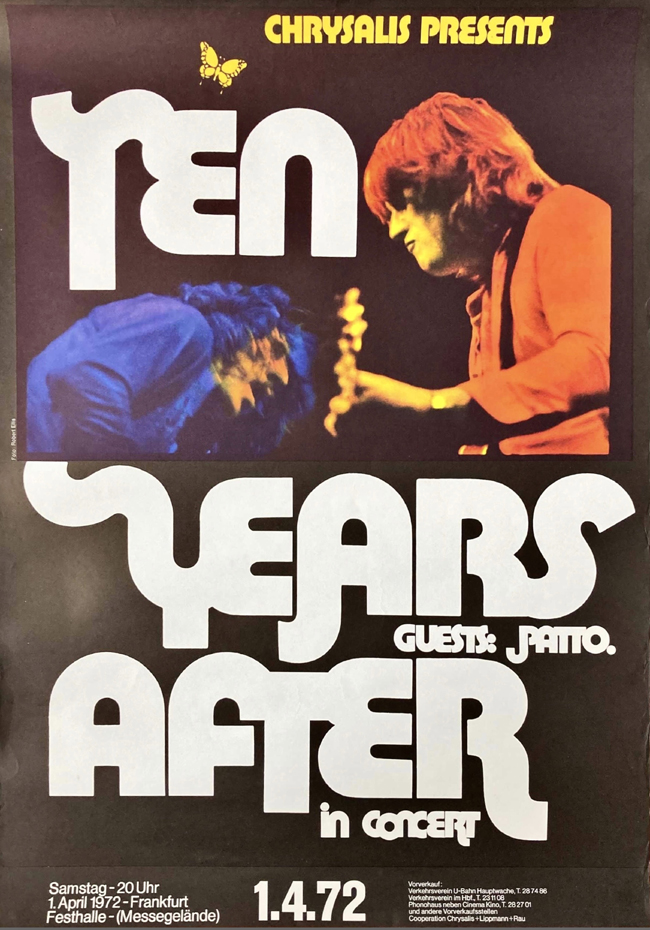
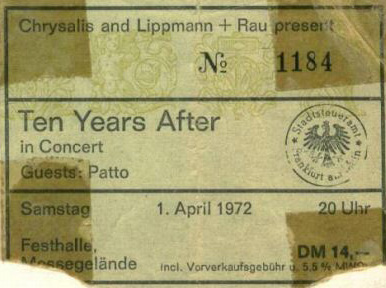
|
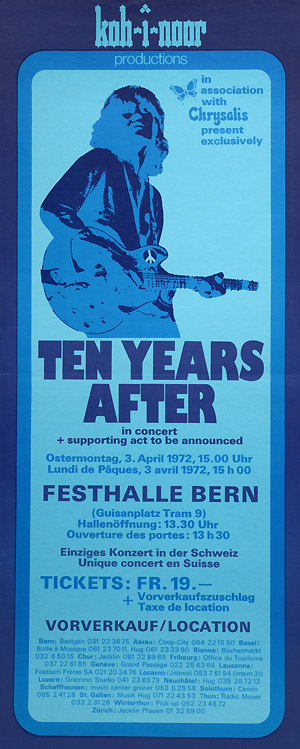
1972, April 3
Bern, Switzerland
Many thanks to Christoph
Müller for his contributions |
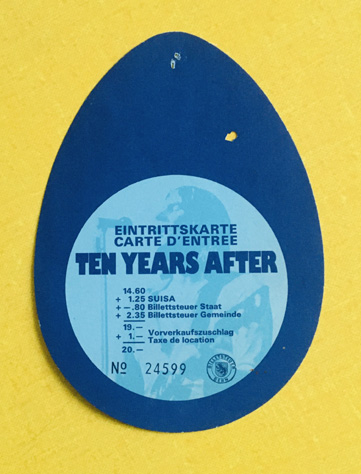
|
|
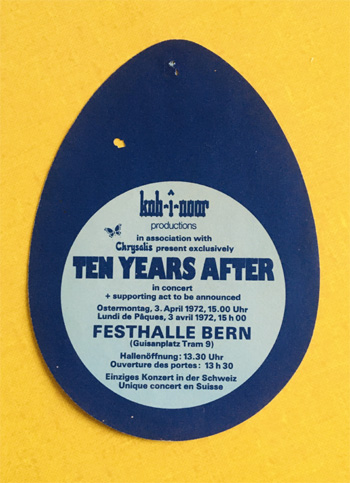 |
April 5, 1972 - Der Bund - Concert Review
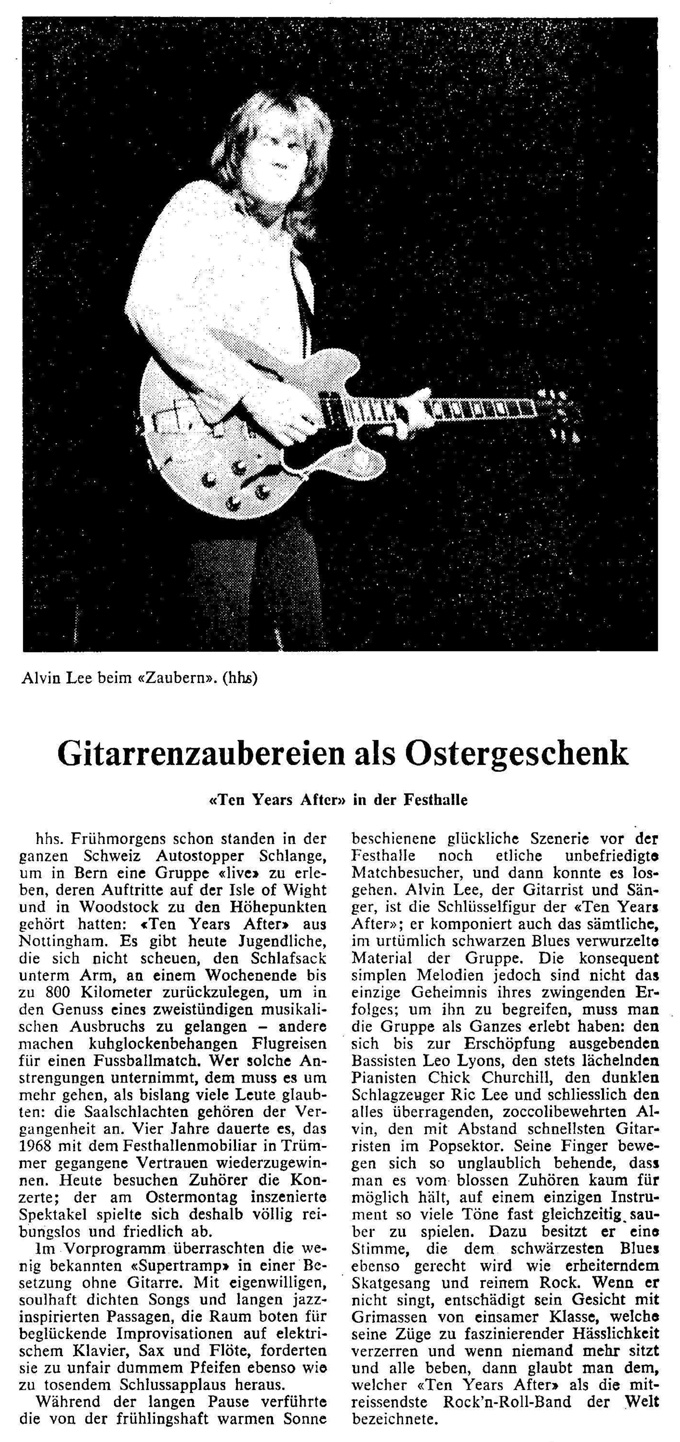
Ten Years After in der
Festhalle Bern, Ostermontag 3. April
"Der Bund", 5. April
1972
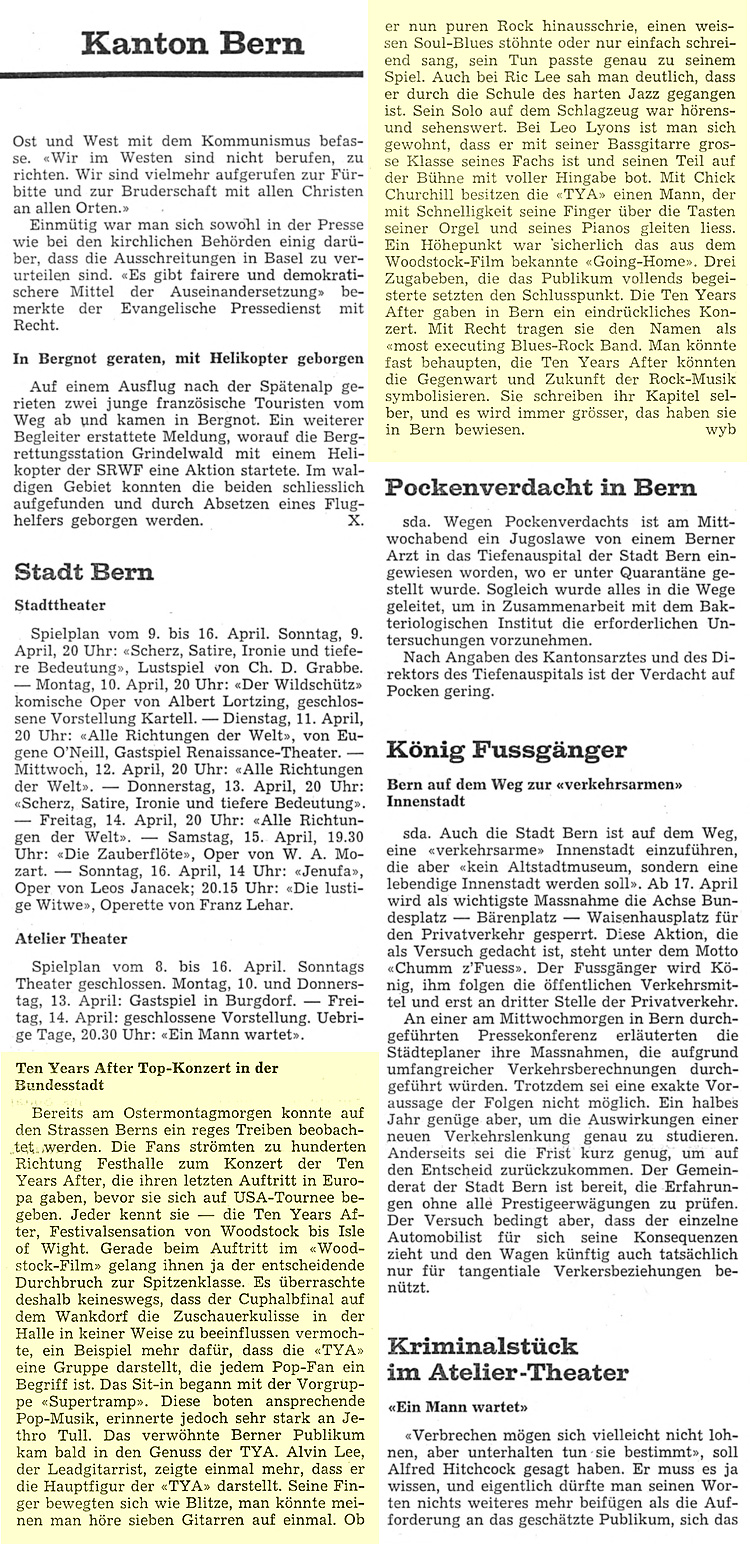
April 6, 1972 -
Concert Review - "Thuner Tagblatt" newspaper
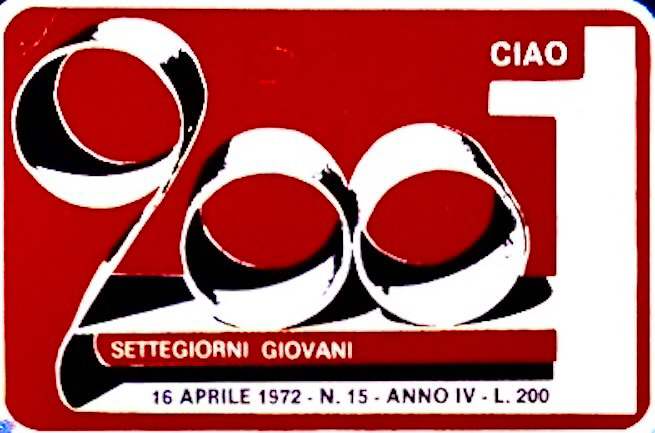
16 April 1972 -
ciao2001
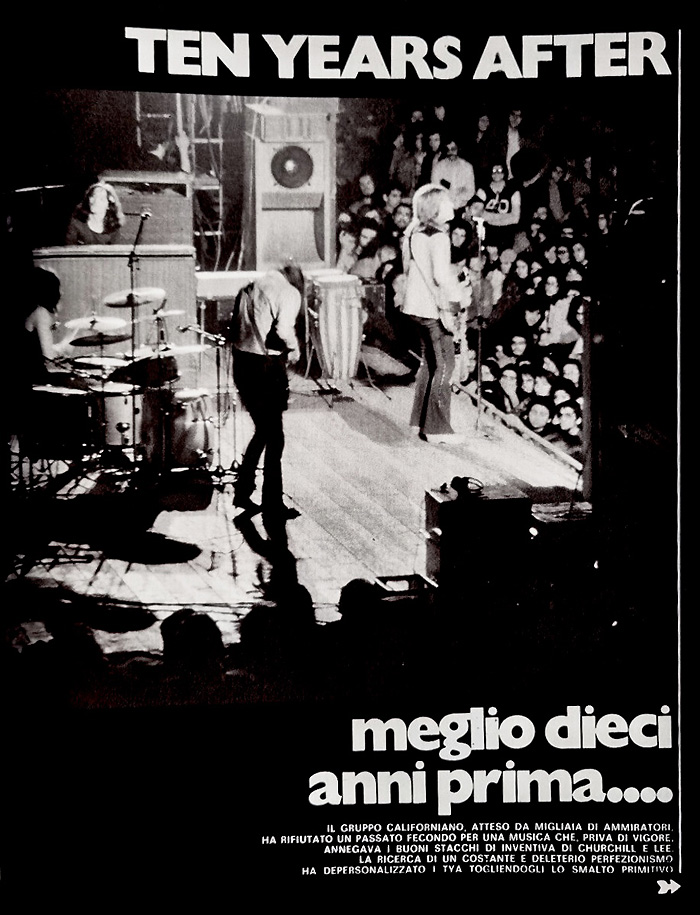
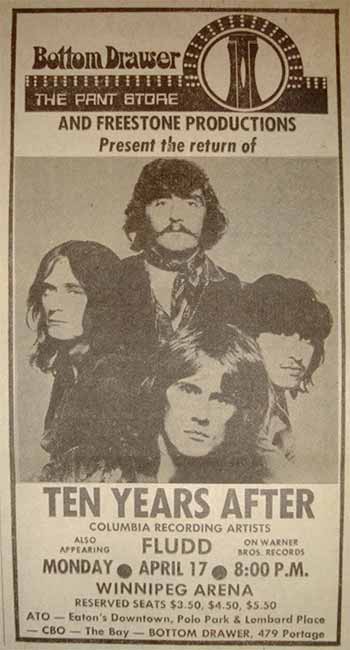
April 17 - Winnipeg Arena
|
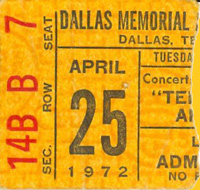
|
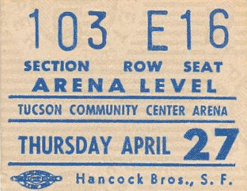
Ten Years After with Procol Harum
|
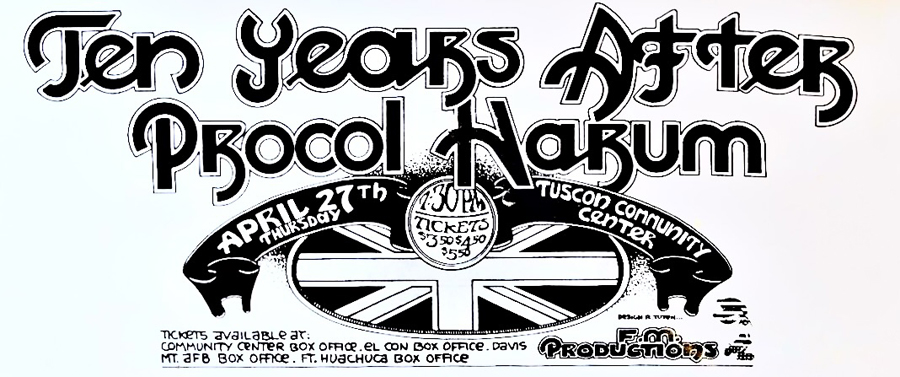
April 27 -
Tucson Community Center - Advertisement
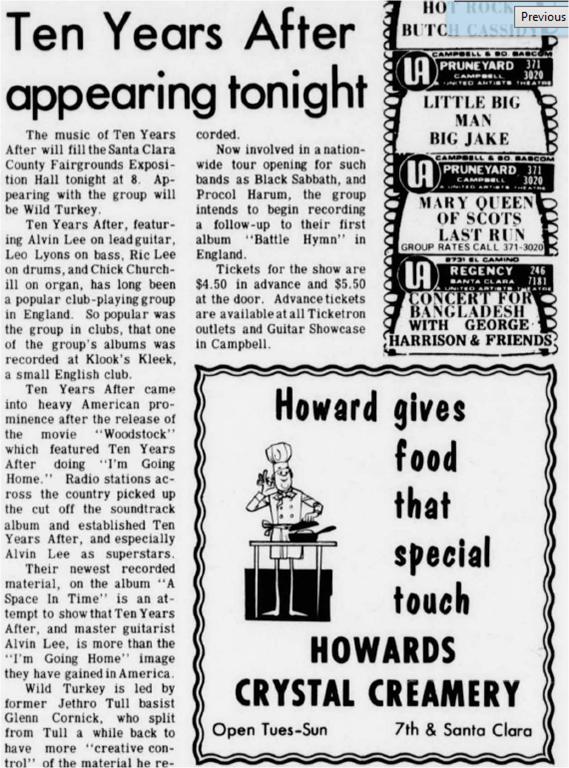
April 28, 1972 (our thanks to Alessandro B.)
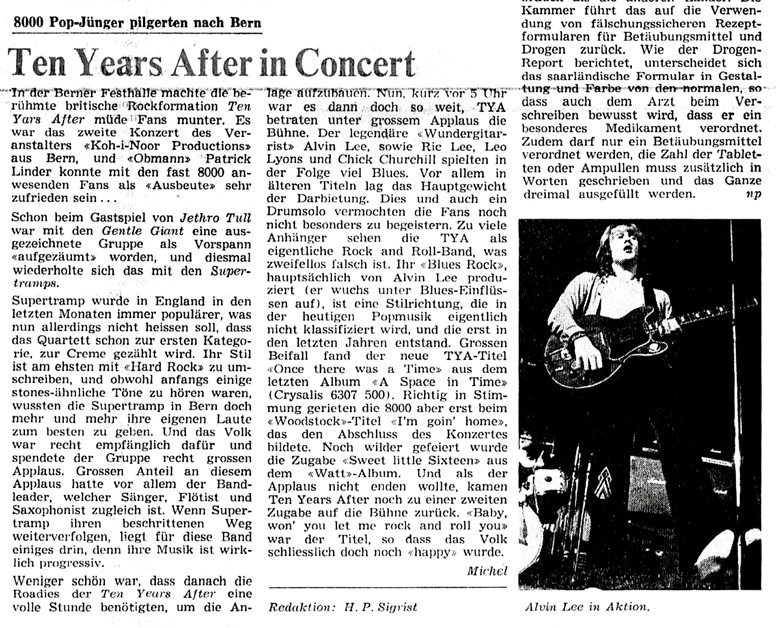
April 29, 1972
- Concert Review - "Die Tat" newspaper
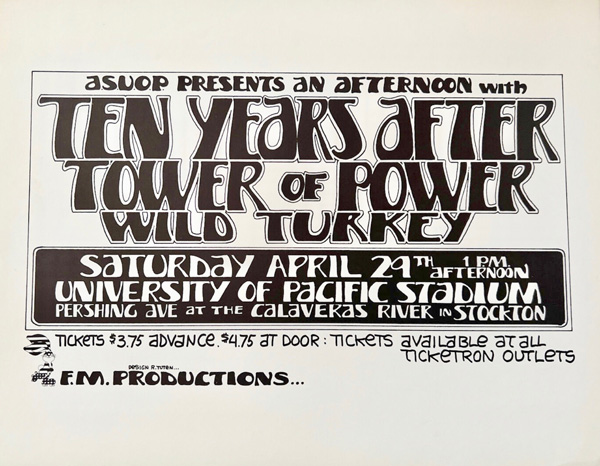
Ten Years After in
concert,
April 29, 1972
at the University of the Pacific -
Amos Alonzo Stagg Memorial Stadium, which is a
Stockton, California Landmark. It first opened in 1950 and
overnight it became the city’s entertainment centre. The
Stagg Stadium really was the centrepiece of the Stockton
Campus, because it hosted so many big sports and concert
events. A lot of our alumni have a lot of fond memories of
events that took place there. When the rock group Ten
Years After performed at the stadium, the opening bands
were, Wild Turkey and the Tower of Power. On May 5, 1972
the rock band Chicago also performed at the stadium. The
Ten Years After Set List, is as follows:
- One Of These
Days
- Once There Was
A Time
- Good Morning
Little School Girl
- Hobbit
- Slow Blues In C
- Classical Thing
- Scat Thing
- I Can’t Keep
From Crying Sometimes
- I’m Going Home
- Choo – Choo –
Moma
- Baby Won’t You
Let Me Rock and Roll You
- Sweet Little
Sixteen
13 Roll Over Beethoven |
|
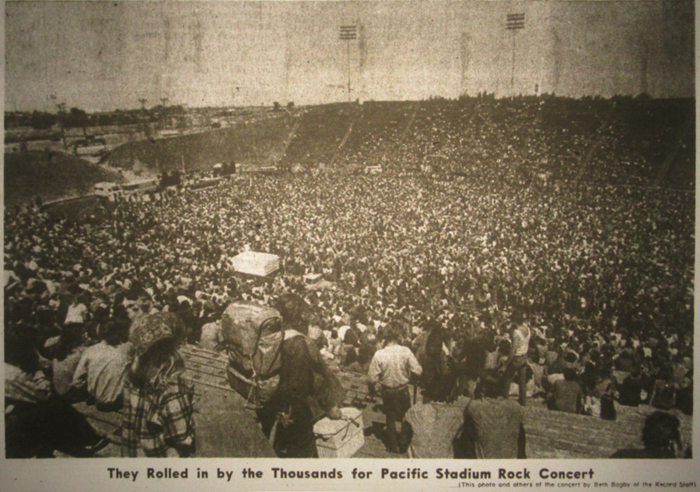
All was not
peaceful at this concert. Garry Lemmons, a nineteen year
old Madesto, California cannery worker, was killed and
another man wounded from a “wild gun shot” during an
altercation at the Pacific Memorial Stadium Concert that
featured England’s Ten Years After, the Bay Area’s own
Tower of Power and Ex-Jethro Tull members who formed Wild
Turkey.
This and the fact
that three men suffered strychnine poisoning at a Chicago
Transit Authority concert in 1972, which drew an estimated
20,000 people, brought an end to the concert run there.
Marc Corren recalled that on May 10, 1969 – the stadium
hosted the “Pacific Pop Festival” which featured: Santana,
Cold Blood, Elvin Bishop and Sons of Champin.
A very sad ending to something that started out so good
and positive.
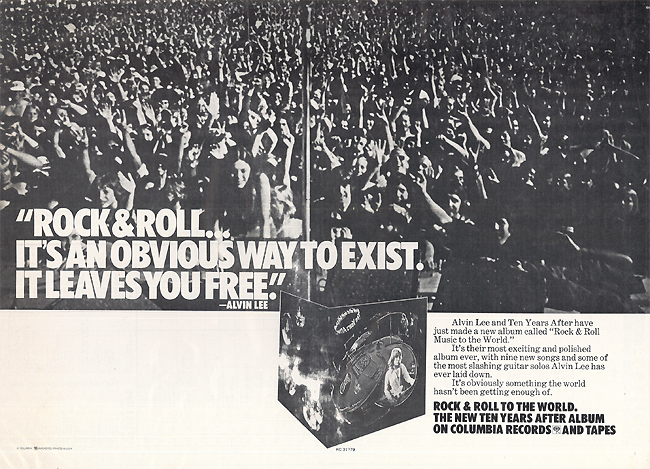
The Audience Photo Above Was Taken By
Alvin Lee From The Band's Stage Perspective |

Record Mirror – April 29, 1972
Ten Years After –
Alvin Lee & Company (Deram)
This is an album,
that it must be pointed out, that Ten Years After are
totally against the release of, since moving on to another
record company (Columbia). Only six tracks are featured
here, including the mammoth “Boogie On” lasting over
fourteen minutes.
Heads around the
Lyceum might bob to a live performance like this, but on
record it’s pretty disastrous, with each member taking a
solo outing on their own instrument, then join in all
together for the big build up. The opening track “The
Sounds” has a fair vocal treatment and the most
interesting aspect of “Rock Your Mama” is the vocal
effect, that is alternating between each speaker in
stereo. But generally, it’s all pretty uninspiring.
Article by V.M |
POP
Magazine, May 1972
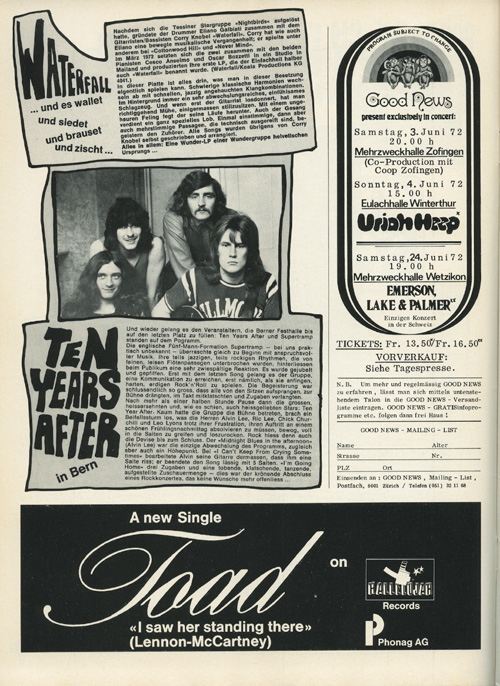
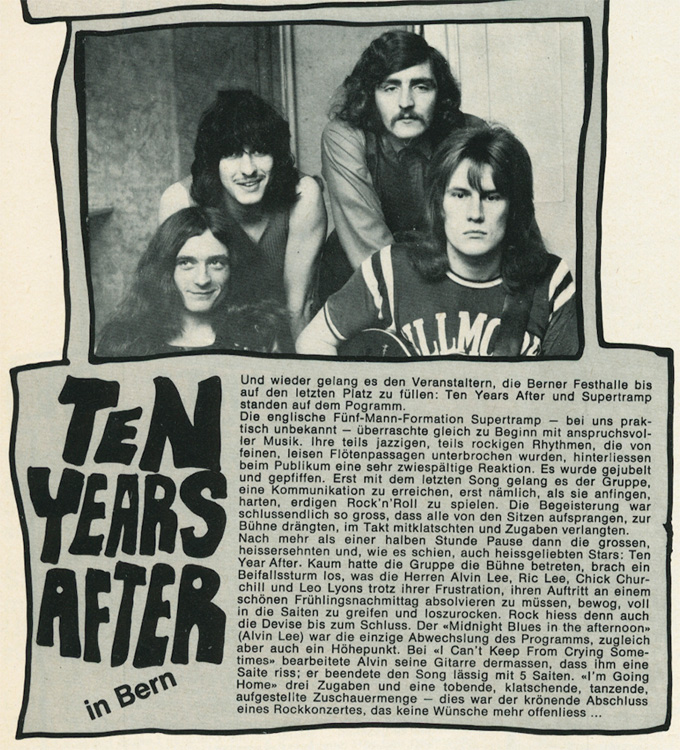
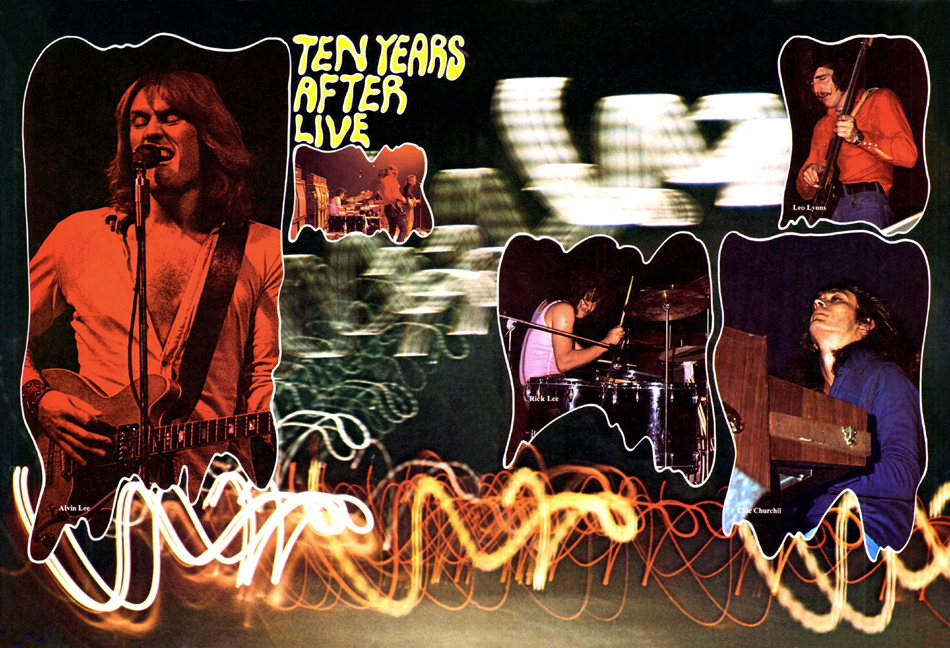
May 1972 - POP
Magazine, page 32 & 33
- Contribution by Marcel Aeby -
|
6 May, 1972
- New Musical Express
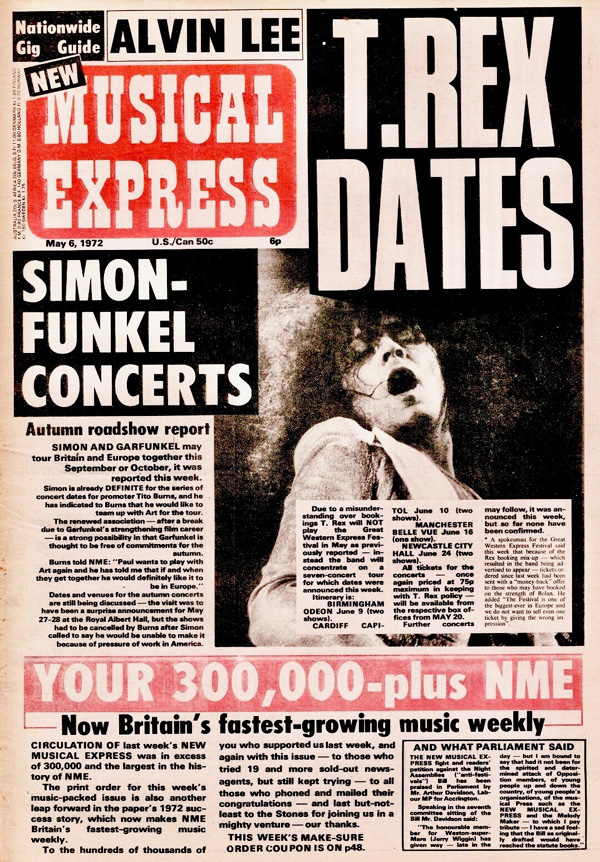
New Musical Express 6/5/1972
Question: To Get Into Another Completely Different Kettle
of Fish, As They Say.
What Do You Feel About Decca’s Release of Alvin Lee &
Company. I Know We Mentioned It Earlier, But We Didn’t
Completely Go Into It. Could You Tell Me About The
Material On That Particular Album?
Answer: It’s Left Over From Albums. It’s Left Over From
"Stoneheng". "B" Sides of Singles Which Were Put Out and
Were Nothing To Do With Us Anyway. You Can’t Tell Them
They Can’t, It’s Like Saying You Can’t Have Any Money –
"Well" – You Say, "If You Release A Single It’s The Record
Company Promotion For The Album. We Don’t Do "Top of the
Pops" and We Don’t Do Any Television. We Won’t Do Any
Promotion On It, So Please Yourself." This Album Is The
"B" Sides. One’s A Very Early Single We Did At The Same
Time We Recorded The First Album. It’s Not Too Bad:
Everybody’s Interested To See What Kind of Material We
Decided Not To Put On Our Albums For Them To Buy. But
Apart From That, They Didn’t Consult Us On What They Call
The Packaging of It. They Didn’t Say They Were Going To
Use A Photograph of Me and Call It "Alvin Lee and Company"
If They Had I Would Have Said No. What In Fact I Said Was,
"If They’re Going To Release An Album of Rubbish, Why
Don’t We Look Around Ourselves For Better Material To Use?
Question: Would You Object To Decca Releasing "The Best
Of…"?
Answer: You Can’t Object. We Have A Recording Contract
Which Everybody Has To Sign,
They Own The Songs. We Can’t Re-Record With Decca. They’ve
Got Thirty-Five Original Songs, Some of Which We Play
Completely Differently Now Because of Those Deals.
We
Signed When We Were A Bit Green. We Don’t Even Own The
Rights To Play The Stuff, Which Is Sad. But It’s
Irrelevent Really, Because We’re More Concerned In Doing
New Stuff. I Don’t Mind Albums Being Released, As Long As
People Know They’re Leftovers.
If
They Did Do A "Best Of" It Could Be Good and It Could Be
Bad. There’s Nothing We Could Do About It. The Thing Is,
We Could Do A Better One, But They Won’t Communicate With
Us About It.
Question: How Long Have You Been Together As A Band, and
How Long In The Present Form?
Answer: About Four and a Half Years. There’s No Reason For
The Band Not To Continue In Its Form For A Long, Long
Time. A Band As Old As We Are, Has A Problem In Keeping
Ourselves In Tune With The Music We Play. The More We
Play, The More Rehearsals We Do, Because The More Used We
Get To Hearing What We Do. When You’re Doing An Extensive
Tour – Playing Every Night – What You’re Doing Is
Performing Your Music To The Audience Every Night. After
Awhile, Although There Are Subtle Differences Which A
Musician Could Get Into, It Does Tend To Sound Much of a
Muchness. You Tend To Fall Into What You Did Last Night,
Because "That Sounded Good Enough". That’s The Kind of
Attitude That Comes In. It’s Really Hard Playing Every
Night and Travelling On A Plane.
You Don’t Have Much Time To Rehearse Or Think of New
Ideas. This Is Why We Work In Tours, Rather Than Just
Play. We Do A Tour For A Month, Play Every Night, Then
Throw New Ideas Around. If We Can Come Out With Three New
Numbers For The Next Tour, Well That’s Enough To Get Into.
We Record Every Night Ourselves. We Always Record
Ourselves Live, and We Listen Back To The New Numbers and
Make Changes.
Question: About Two Years Ago You Nearly Went To Russia,
But You Didn’t Go There,
Are You In The Future Planning To Do Iron Curtain
Concerts?
Answer: Well No. That’s One Thing That "Woodstock"
Stopped, Actually Because We Were Going To Play The Iron
Curtain Countries On A Basis of a Cultural Exchange.
"Woodstock"
Led Them To Believe It Would Be More A Rock ’n’ Roll
Concert Than A Cultural Exchange, Which In All Fairness,
It Probably Would. So I Don’t Think There’s Much
Possibility of That Happening Now. We Get Loads of Letters
Now From Iron Curtain Countries. They Can’t Buy Albums
There, They’re So Surpressed, Silly Things Like They Can’t
Buy A Ten Years After Album Or Anything. It Really Affects
These People and They Write and Say They’ll Exchange Their
Czechoslovakian Folk Records For Anything We Can Let Them
Have.
It’s Sad, Sad. Something Like Music, Man, You Should Be
Able To Go and Listen To Whatever You Want. Ideally, You
Should Be Able To Go Whereever You Want and Say Whatever
You Want. But It Does Seen Difficult In This Over
Populated World.
|
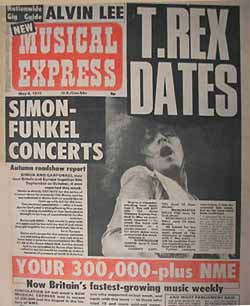
The Private Life of Alvin Lee
- by Simon Stable
New Musical Express May 6, 1972
Alvin Lee of Ten Years After seems to spend more time on tour
than on holiday, but recently before yet another American
tour, I managed to get to see him at his country home. After a
pleasant and enjoyable chat he played me a track he’d written
and recorded the night before, a number
he’s thinking of putting on the next album. It was
another of his fast foot-tapers with plenty of harmonica and
guitar panning from side to side. He told me he was planning
to call the song “Holy Shit”, though he did say he might be
forced to change the title and some of the words. I’ve known
Lee for about three years and, despite his success, I’ve
always found him to be an easy-to-get-on-with guy. He is, as
the following interview may show, an interesting and
intelligent person.
After your third album “Stonedhenge”, why did you change
producers? Why produce yourself?
Good question. Well, when we did our first album we were very
new to the whole recording situation, and our producer was
provided with the studio and we were told to appear at ten
o’clock in the morning and make an album. And it was out in
four days. We were very green. We just recorded all the
numbers we did on tape in the studio. I don’t think at the
time we even heard it until it came out. When it finally did
go out, we were quite disappointed, really, as the result
didn’t seem to have the dynamics of the record we had played
within the studio. And we realised this was down to the
recording techniques. The second album was live, so there was
nothing to do about that. Then we decided to produce
ourselves. Still, being rather green we used the same studios
that we’d been given. It’s a Decca album, so we used a Decca
studio. It only had a four-track machine. There were no
facilities for panning stereo, and what little bit of that we
did we had to have equipment specially made.
We had this little box made to pan across an
instrument, from one side to another. That’s the reason for
all the corny panning,
just one box with one knob on. It was just a matter of getting
into the format. Getting to know what it was all about. We
realised that rather than doing what somebody else suggested,
who wasn’t really interpreting our music the way we wanted it
interpreted, anyway, it would be best doing it ourselves. Even
if you make a mistake, I believe that your own mistakes are
better recorded than someone else’s. Ten Years After music is
quite personal to us as musicians, and I think it should be
recorded our way than the way a third party sees it. I believe
of all musicians , I find it hard to respect a musician who
uses a producer, because I think that if a musician knows what
he wants to put down, he should do it himself.
That’s where the art of recording comes in, to know how to
apply your music to the tape, to get the results in. We
haven’t, to my own personal satisfaction, done anything at all
incredible, but every album has had good bits, and we’ve
learned from them. So, hopefully, we are in control and will
make them better and better as we go along, which is the
logical progression anyway. I must be putting producers out of
business!
Do you feel your part in “Woodstock” helped your career as a
musician or not? I mean, it put you in the public eye, but did
you not find you were playing more and more request, and less
and less of the things you actually wanted to do?
Well, we never play request. We never play anything other than
what we want to do. However “Woodstock” did have considerable
effect. When we did “Woodstock” we didn’t realise it was going
to be such a big thing, just a festival which we had to arrive
at on time. It wasn’t until we got into a helicopter, and flew
in, that we realised what a big thing it was. Even then, we
weren’t to realise how much world attention it would get,
which it did. It was on national news in America and
everything, and that’s more than I expected, so the kind of
publicity we got from being in the “Woodstock” film initially,
like gave us a boost in popularity. A lot more
people had heard us, where as before “Woodstock” we were still
playing the concert halls and we were still selling enough
albums, we were doing really well. After “Woodstock”, well we
found that more people were coming to the concert halls, more
people were buying the album, but it was on the strength of
“Going Home”, which is a nasty situation. You can’t take
control of it. First, like, a lot of young kids were coming to
the concerts who weren’t particularly into what we were trying
to do, merely into us having been at “Woodstock”, and it was
more or less a kind a rock ‘n’ roll circus, which is what we’d
been trying to avoid up to then. And it got a bit out of hand,
and I did in fact regret having been in “Woodstock”…fearing it
was going too far out of hand, but we used the opportunity of
the press and that, doing Press articles to say that we wanted
people to get into the structures of the music, and listen to
what we were trying to do as well as rock ‘n’ roll.
EXHILARATED:
I explained, that we rock ‘n’ roll at the end, just to
have a good time. Roland Kirk does the same thing—plays all
his serious structures for two hours, then ends up laying on
the piano playing a twelve-bar. It’s a good way to finish off
a gig: gets
everything out of your system, and everyone can have a good
rave-up and go home feeling exhilarated, which is a good
thing. But I feel that if “Woodstock” had used “I Can’t Keep
From Crying”, it might have been a bit more helpful to us,
‘cos it would have spotlighted the more constructive stuff
we’re doing. But all in all, now that “Woodstock” has died
down, I don’t think it has made much difference. It might have
turned-on a younger audience, maybe they’re now into something
else. I find the straight pop, the entertainment side of
music, has a very select audience. It’s not something we get
involved in. Like singles, we don’t get involved in them,
because you have a hit single, then “Top Of The Pops”, it
doesn’t bring anything that progresses the band. Like a band
that’s nowhere can have a hit single, and suddenly start
getting a reasonable turn out for their concerts and probably
better contracts for their next single. But they’ve got to
keep on recording hit singles, and to do that there are people
that specialise in aiming hit singles at the mass market. It’s
a disgusting , soul-destroying kind of business to get into. I
believe the musician should record the sounds he likes and
wants to express, and a lot of it as far as we’re concerned is
left to chance.

When TYA took off it wasn’t because we aimed to write
music at the audience, it was just that people had
picked up on what we were doing, and the more we did it,
the more people got into it. That’s all it’s ever been
really.
When thinking of Ten Years After, one usually thinks of
Alvin Lee rather than the rest of the band. Do you ever
feel any resentment from the others? TYA is a co-op, we
all get paid the same; we all attempt to do the same
amount of work; we all tour the same, because I’m the
singer and the lead guitarist, it was quite on the cards
I should be singled out as the front man, because I
stand in the spotlight. It was intended originally, when
we started out, we hoped to make it four people on an
equal level. It was through nothing to do with ourselves
that this Alvin Lee business got picked out, we
didn’t encourage it.
We had to disown this new Decca album they’re bringing
out of old tracks, because it’s got Alvin Lee and Co.,
and that’s the very thing we’ve been trying to avoid. We
talked about it when it happened and said, “look, this
looks like it’s going to happen, and there’s nothing
much we can do about it.” When people say Alvin Lee this
and that at concerts, I usually personify what they
either like or don’t like
about the band. It’s just how they refer to the band.
You yourself say that when one thinks of TYA, some
people do think of an Alvin Lee back-up band.
To our minds it isn’t. It’s not a thing to really get
concerned about ourselves, it’s irrelevant to what we’re
trying to do. It’s a kind a super-star role, which we’ve
never encouraged, it’s just a kind of misunderstanding. I
mean, I can explain myself completely to anyone who calls me
a super-star, but I know very well they don’t know me,
they’re just saying that without enough knowledge, so
there’s no answer to it. It’s a shame that everybody can’t
understand every musician that exists for the true fact of
what he’s trying to do. Eric Clapton is your number one
guitarist, and so many people adore Eric Clapton and hate
everyone else for no logical reason, it’s just the way
things go. You can’t control it, it’s just the way people
think.
Your last album “A Space In Time” didn’t do incredibly well in
England. Do you feel this had anything to do with the fact
that American copies were imported and on sale long before its
British release? Or was it that the album wasn’t up to
standard?
Well, I wouldn’t say up to standard, I think the standard as
far as we are concerned was better in some ways. The major
reason it didn’t do as well in your album charts was due to us
not releasing it at the right time in England. We were
pressured to get a release date with the new Columbia label in
the States, so we released it there first. It was three months
before it was released in Europe, and a lot of European sales
were lost because of the import shops buying it from the
States.
NO IMPORTS: That helped the sales in the USA, it was a
gold album in the States, the first one, so obviously it was
received there better than anything else we’d done. That’s the
reason I was given when I said “what’s happened to the last
album?” I think it’s true. Our next album is going to be
released on the same day world-wide, so every market that
sells it will be selling their own copies, not importing it
in.
What did you feel about your concert at the Colosseum. Was the
Sunday night better than the midnight, Saturday?
Oh yeah, The midnight show was a bit slow, the audience seemed
tired. Those things like having to wait an hour from the time
you got in, to when the first band played, always affect a
concert. That can be the difference between going down well
and having chairs thrown at you, whether the road managers and
equipment function well, and it all comes together in time or
not. If it doesn’t go well there’s nothing you can do except
get it together as quickly as possible. I wasn’t disappointed
with any of the concerts.To my mind there’s no good concert
hall in London. We didn’t play the Rainbow unfortunately, that
might have changed my mind. You see, we were
playing to four balconies at the Colosseum, an eighth of the
audience. With our spherical array of speakers and horns we
can hope to cover about a hundred degrees of sound, which is
about forty percent getting good sound. It’s just acoustic
problems and technical difficulties in projecting the sound
into the audience, which is always a problem where ever you
go.
UNFORTUNATE:
There will always be people getting bass boom, always
be people hearing too much guitar, too much vocal. I think
people who sit in the middle, about ten or fifteen rows back,
get a good sound and know what’s going on. It’s unfortunate
that someone standing at the back gets the sound blocked off
by people standing up in the front.
It’s Better At Festivals, in Fact?
Right, you’ve got no acoustic problems, and you’re in the open
air, which is always nice. There is a problem being in the
open air that is easy to overcome, you just have to use a lot
of power and a lot of speakers. It’s when you get sound
bouncing around halls, hitting the ceiling and bouncing back.
When you play loud, it’s a different case. You get good sound
drifting across an auditorium, reaching a listener up on an
acoustic level, but when you’ve got a lot of sound coming out
of the speakers, then suddenly the corners of the room, and
what the ceilings are made of, start affecting the sound.
These are the problems, more or less.
You’ve just been on an extensive European tour and you
frequently tour America and Japan. Which countries do you
prefer to play most and why?
Well, it changes, at the moment I really enjoy playing in
England. The last concert we did, you could hear a pin drop
all night long, and people really sat listening, getting into
what we were doing. When it came to like rock ‘n’ roll at the
end, they got into that and had a jive around, which is—as far
as the format of our concerts go—perfect . More recently than
that we did the colleges, which was like getting back to the
roots-razzle-bit after playing Madison Square Gardens and the
Philadelphia Spectrum. Twenty thousand people. Really it was
almost a shock. The first college we did was at Reading
University: it’s just a little wooden hall with about 1,300
people in it.
You go on stage and there’s none of this Ten Years After bit,
awoah! You just walked out and said hullo, and people were
sitting there and it was like getting back to the old club
bit, I really enjoyed it. I felt you had to really kind’ve
work; get things to work on stage. At a really big concert it
becomes a bit like a circus, often comparable to feeding lions
to the Christians at the Colosseum in Rome. You stir up so
much excitement: by the time the band goes on you sometimes
feel that what you play isn’t that important. That’s a wrong
feeling to take, but sometimes it occurs to you when you do a
lot of concerts. When you walk on stage and people cheer for
two minutes you feel flattered but are they going to listen to
what we are going to do? And half the while, they’re cheering
through the first three numbers as well. They’re just having a
good time, which is great, but I like people to listen to the
music. If you go down well I like to feel it’s been
earned—rather than just happened.
Are you going to do any festivals here?
I hope so. I want to see festivals continue myself, for more
reasons than one. I don’t know of any plans to do a festival,
but we’ll spend time in England after we’ve recorded the next
album. We’ve got possible dates for festivals, but nothing’s
been confirmed.
On your last album you added strings to your last track—are
you in fact thinking of adding horns on the next one?
Yeah, thinking of it. On an album we try and show where our
music is at, but for variety, we try and have a couple of
tracks to play around with, and we always find it nice to do a
track which is out of character so everybody says ‘Why Good
Lord This is Nothing Like Ten Years After!!!! So therefore, if you put a nice soft mellow un-Ten Years
After between two Hard TYA tracks, it adds to the overall
variety of the album. You don’t get this grind, grind, grind,
grind of some rock albums, because they’re all the same tempo
throughout. So for that reason alone, we really enjoyed doing
the strings on the last album.
It was just an experiment to see what we could do with
strings, and I’m really happy with it. It’s one of the best
string things there is. It had very little to do with TYA’s
music as people would think of it, but there again, music
doesn’t really mean that it’s just what people have picked up
through things like “Woodstock”, and variety is quite
important to us.
We’ve just been recording in the South of France. We hired a
big house there and the Rolling Stones’ mobile truck, and
whether we were influenced by being in the Rolling Stones’
truck, or whether it’s that the Rolling Stones truck has its
own sound, I’m not sure—but a lot of the tracks we did there
sounded very similar to the Stones. So rather than just forget
them, just for a joke we got a saxophonist from Supertramp to
overdub some sax parts on it and beef it up. If you listen to
the last Stones album without the overdubs it’s quite
surprising, and if you listen to some Beatles tracks without
the overdubs there’s nothing there. Some people specialise in
overdubs, but we don’t. We specialise in the basic four
instruments. But I don’t see any reason why, for one or two
tracks, we don’t have a nine-hundred-piece orchestra just for
the variety of it all. It’s a groove to do, so we’ll probably
get into something like that.
INFLUENCE:
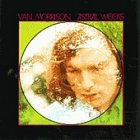
Your best album to my mind was “Cricklewood Green”, and the
best track on that was “Circles”. I liked it because it was
acoustic. Are you planning more things in this vein?
This was a side trip again. It was a direct influence from
“Astral Weeks” by Van
Morrison, 1968
which moved me considerably at the time, and I used that
kind of format; the folk acoustic format, to say something I
wanted to say. Which was life going round in circles, which is
a pretty…..well, it was just a phase I was going through. I
mean. I still think that way sometimes. It was more of a folk
outlet to me….more like a truthful thought….a thoughtful
thought being sung instead
of spoken. I haven’t had any other ideas along the same
vein. We could always do something like that. We did acoustic
stuff on the first album and third album. It’s not planned. It
was where we were at, really. I mean, the last album showed we
could play some nice tunes, so I’m happy with that, that’s
past. I think we have to show now, more of our expression of
our own selves and our instruments.
|
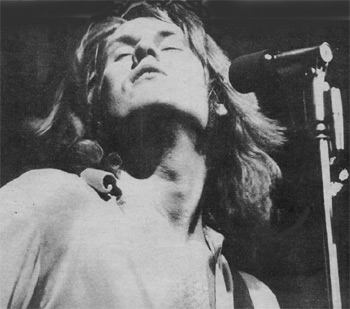
|
New
Musical Express
May
13, 1972
This is the concluding interview by Simon Stable with
Ten Years After guitarist Alvin Lee. Here Lee talks
about his film ambitions, and discusses Ringo Starr’s
venture in the same field.
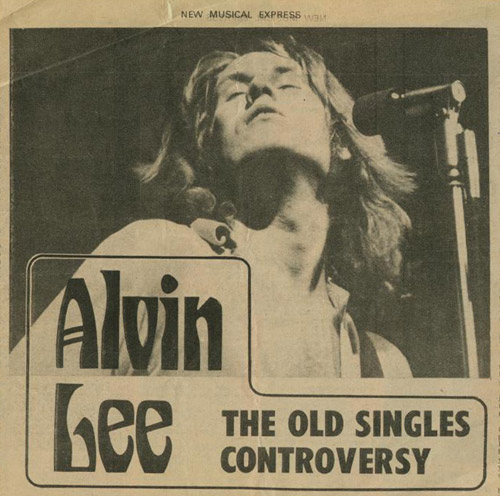
Simon: Alvin, I know
you’ve been into photography and making your own private
films for some time. Are you planning in the future to
make a full length feature film. With perhaps your own
electronic sound track?
Alvin:
I’d very much like to. At the moment I’m finding out how
much practical experience I lack to do that. However
perseverance could bring something out like that along
those lines.
Looking at the world of commercial films, it’s rather
disenchanting ---a bit like looking at pop singles. I’d
much rather be involved in something artistic, in making
a documentary of what a camera sees rather than making a
story about whatever---combining visuals and sound to
create an environment for the watcher.
All of this very much in the air at the moment.
It’s all gossip, depending on what type of filming or
video system is going to come out.
If you can get your hands on a video studio that will
convert your tape into film, you’ve got a lot more
technical control with what you can do with the visuals.
I’m well ahead on sound, I’m quite confident I can do a
good soundtrack to any movie, and I’m quite confident I
can do a good movie, but I’m not quite sure what
direction I want it to be yet.
Simon: Ringo’s doing this documentary of a rock ‘n’ roll
star…(Note: I believe this movie to be “That’ll Be The
Day” released in 1973 which also
features Keith Moon).
Alvin:
I wouldn’t want to get involved in anything like that. I
mean it could be good actually. Anything can be good,
but more likely than not it will be more like light
entertainment than an artistic masterpiece. Ideally a
film I make will be more like an album, being kind of
what happens with the camera with the sound at the time
of making it, and whether it’s good or bad will depend
on whether the heads behind the film are together. To a
point, you have to pick something good to say in a film,
the way that you have to pick something good to say in a
song. It’s the way that you do it that makes it artistic
or a rip-off, isn’t it?
Simon: Would you like to direct a film yourself?
Alvin:
I’d like to be involved in it, but I’d like practical
experience, meet somebody whose done some work on films.
Obviously, it’d help me a lot. I think I’d have a few
original ideas to contribute.
Simon: To get into another completely different kettle
of fish, as they say. What do you feel about Decca’s
release of Alvin Lee & Company. I know we mentioned it
earlier, but we didn’t completely go into it. Could you
tell me about the material on that particular album?
Alvin:
It’s left over from albums. It’s left over from
“Stonehenge”. “B” sides of singles which were put out
and were nothing to do with us anyway. When you do an
album, the record company will take a single off. It’s
part of their bread and butter.
You can’t tell them they can’t. It’s like saying
you can’t have any money. “Well”, you say “if you
release a single it’s the record company promotion for
the album, and not a single. We don’t do “Top Of The
Pops” and we don’t do any television . We won’t do any
promotion on it---so please yourself.” So they release
them for promotion of the album, and this album is the
“B” sides.
One’s a very early single we did at the same time we
recorded the first album. It’s not too bad: there’s some
nice jammers and things on it. At the time we turned it
down for release, so obviously we wouldn’t have chosen
it now. Everybody’s interested to see what kind of
material we decided not to put on our albums, so it’s
probably a good album for them to buy, but apart from
that, they didn’t consult us on what they call the
packaging of it. They did say they were going to use a
photograph of me and call it “Alvin Lee and Co.” If they
had I would have said no. What in fact I said was “If
they’re going to release an album of rubbish and left
over tracks, why don’t we look around ourselves and get
some good stuff put on? But they didn’t want to have
anything to do with that.

Simon: Would you object to Decca releasing “The Best
Of…”?
Alvin:
You can’t object. We have a recording contract which
everybody has to sign---they own the songs. We can’t
re-record any songs which we recorded with Decca.
They’ve got thirty-five original songs, some of which we
play completely differently now because of those deals,
that we signed when we were a bit green. We don’t even
own the rights to play the stuff, which is sad. But it’s
irrelevant really, because we’re more concerned in doing
new stuff. I don’t mind albums being released, as long
as people know they’re leftovers. If they did do a “Best
Of” it could be good and it could be bad. There’s
nothing we could do about it. The thing is, we could do
a better one, but they won’t communicate with us about
it.
Simon: How long have you been together as a band, and
how long in the present form?
Alvin:
About four and a half years. There’s no reason for the
band not to continue in its form for a long, long time.
A band as old as we are has a problem in keeping
ourselves in tune with the music we play. The more we
play, the more rehearsals we do, because the more used
we get to hearing what we do.
When you’re doing an extensive tour---playing every
night---what you’re doing is performing your music to
the audience every night. After awhile, although there
are subtle differences which a musician could get into,
it does tend to sound much of a muchness. You tend to
fall into what you did last night because “that sounded
good enough”. That’s the kind of attitude that comes in.
It’s really hard playing every night and travelling on a
plane. You don’t have much time to rehearse or think of
new ideas. This is why we work in tours rather than just
play. We do a tour for a month, play every night, then
throw new ideas around. If we can come out with three
new numbers for the next tour, well that’s enough to get
into. We recorded every night ourselves. We always
record ourselves live, and we listen back to the new
numbers, make changes to them, and they just progress.
Perhaps the way to stay interested in your own music is
to keep it progressing, keep it moving. There’s no
limitation in my mind as to what four musicians can do,
as long as they want to keep progressing. As long as all
the members of Ten Years After want to play, and want to
play better, and want to play the music to people, then
there’s no limitations. The only limitations are in your
own head, as soon as you start saying you’re fed up and
you don’t want to do this or that---you’re on the
downward slope.
It does happen, we do get fed up, instead of breaking up
we rehearse, which is the right way of doing things, and
although we probably won’t be playing the same numbers
in five years time, I don’t see any reason why we
shouldn’t be still making music in five years time.
I don’t see why there shouldn’t be people that want to
hear Ten Years After in five years time.
There might not be as many people as now---we might
phase out of popularity, but we don’t stop playing just
because fifty thousand don’t want to hear us. We used to
play to a hundred people, and I’d imagine we still
would, if it got around to that again.
We’re all opportunists---that’s about the nearest to
being a business musician---but we’re still not
out-and-out entertainers. We don’t put on a show---tell
jokes and things like that, a lot of the business is
getting into that now. You can go and see Jethro Tull
and you get an actual theatrical presentation, which is
OK….but I find it rather limiting to the band, because
once you’ve got your presentation set---once you’ve done
it five times---it all starts seeming like a cliché to
me. If we ever do a tour with a bad band, and they use
the same jokes every night, it all seems a bit
un-artistic to me.
Simon: Last year, it might have been two years ago now,
you nearly went to Russia, but you didn’t go there---are
you in the future planning to do Iron Curtain countries?
Alvin:
Well no, That’s one thing that “Woodstock” stopped
actually, because we were going to
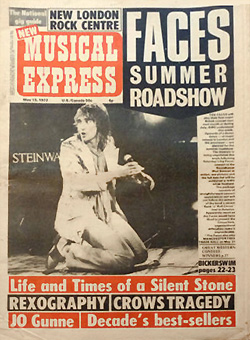 play
the Iron Curtain countries on a basis of a cultural
exchange. “Woodstock” led them to believe it would be
more a rock ‘n’ roll concert than a cultural
exchange----which in all fairness, it probably would. So
I don’t think there’s much possibility of that happening
now. play
the Iron Curtain countries on a basis of a cultural
exchange. “Woodstock” led them to believe it would be
more a rock ‘n’ roll concert than a cultural
exchange----which in all fairness, it probably would. So
I don’t think there’s much possibility of that happening
now.
We get loads of letters now from Iron Curtain countries,
saying they can’t buy our albums there. They’re so
suppressed, silly things like they can’t buy a Ten Years
After album or anything. It really affects these people
and they write and say they’ll exchange their
Czechoslovakian folk records for anything we can let
them have. It’s sad, sad.
Something like music, man you should be able to go and
listen to, whatever you want. Ideally you should be able
to go wherever you want and say what ever you want, but
it does seem difficult in this over populated world.
Special Thanks to Simon's wife Judy Dyble for allowing
us to use her personal copy of this third article,
written by Simon Stable.
|
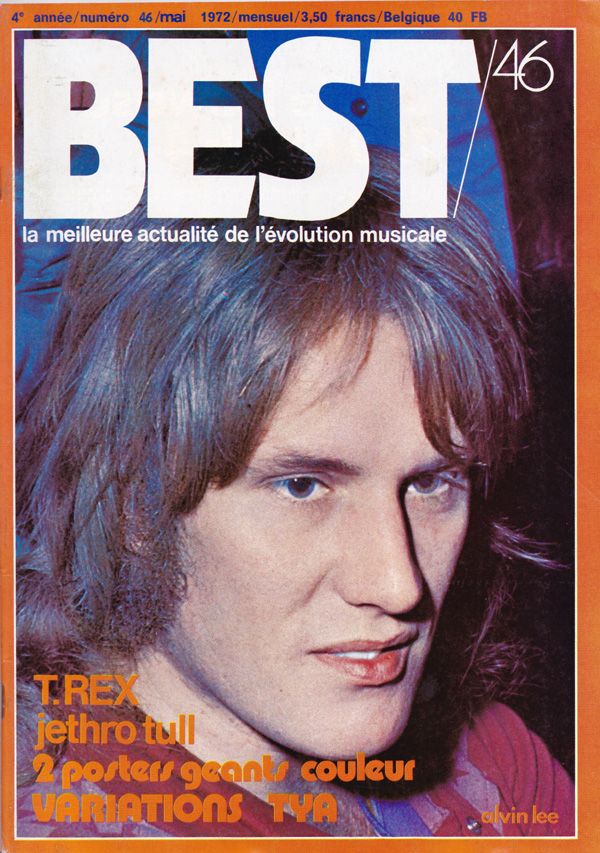
1972 May -
French Magazine BEST, vol. 46
"ALVIN LE BEL"
Photos by
Jean-Yves Legras
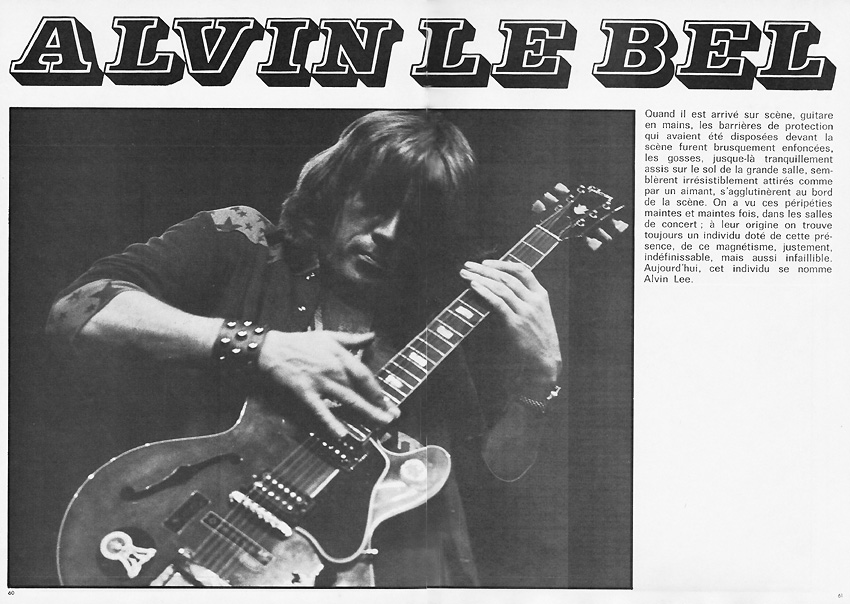
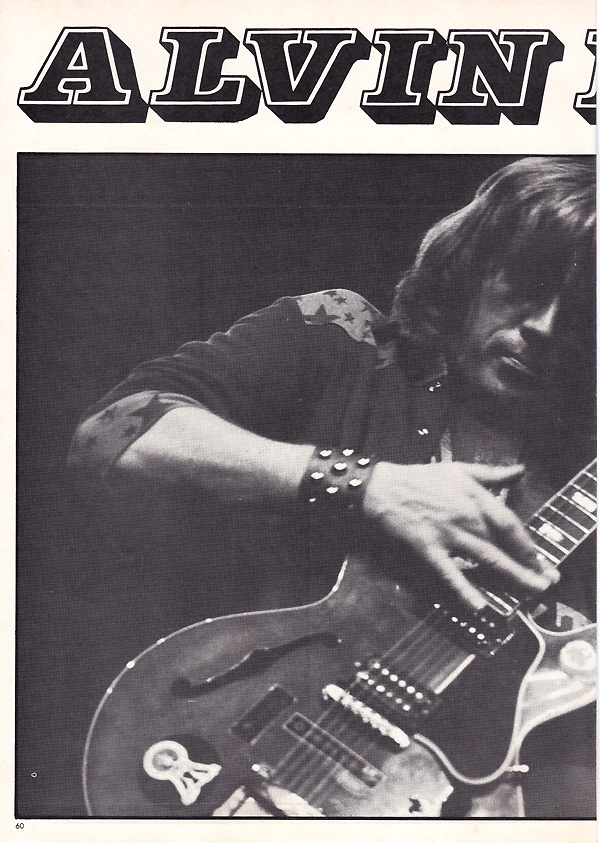
BEST -
page 60
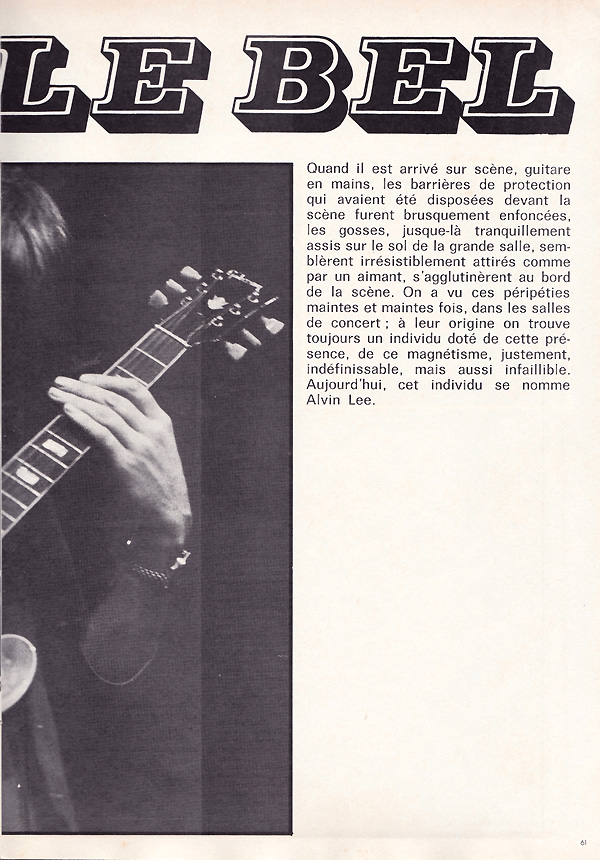
BEST -
page 61
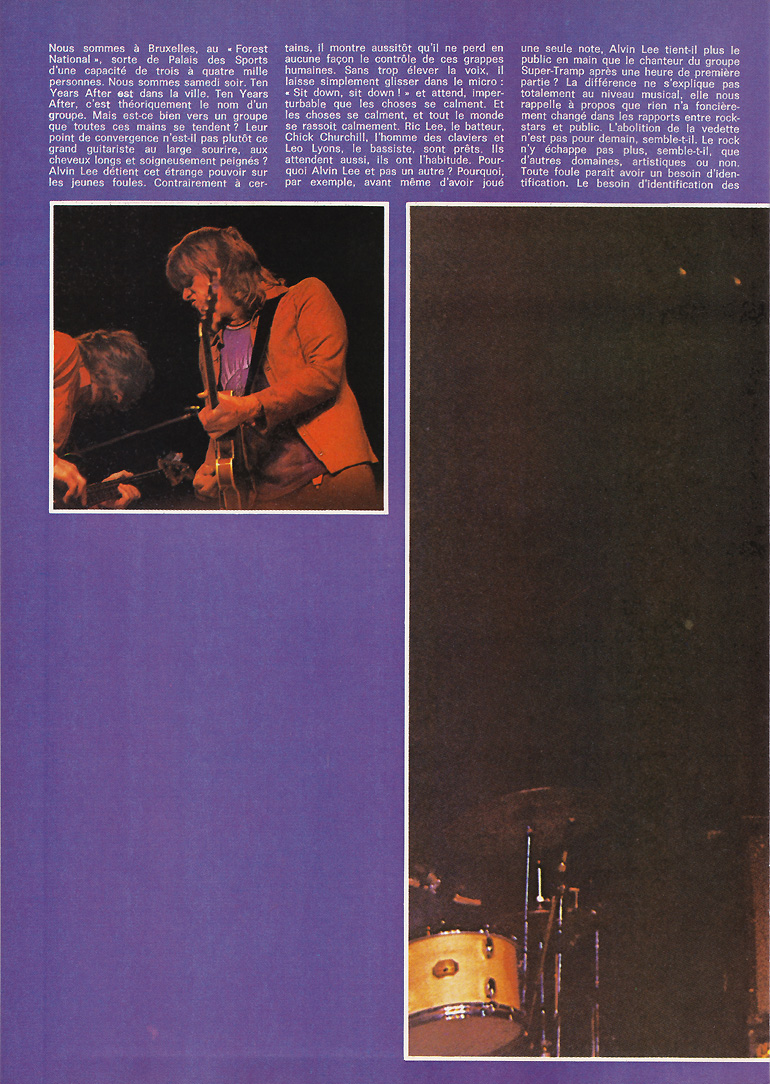
BEST -
page 62
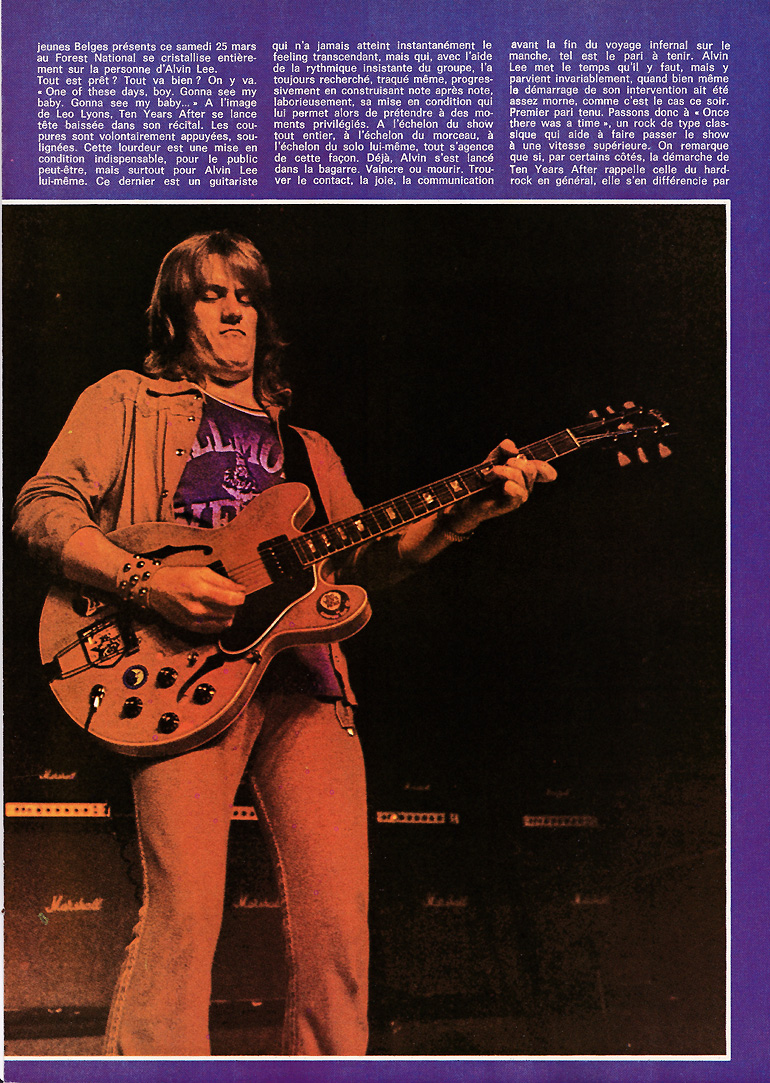
BEST -
page 63
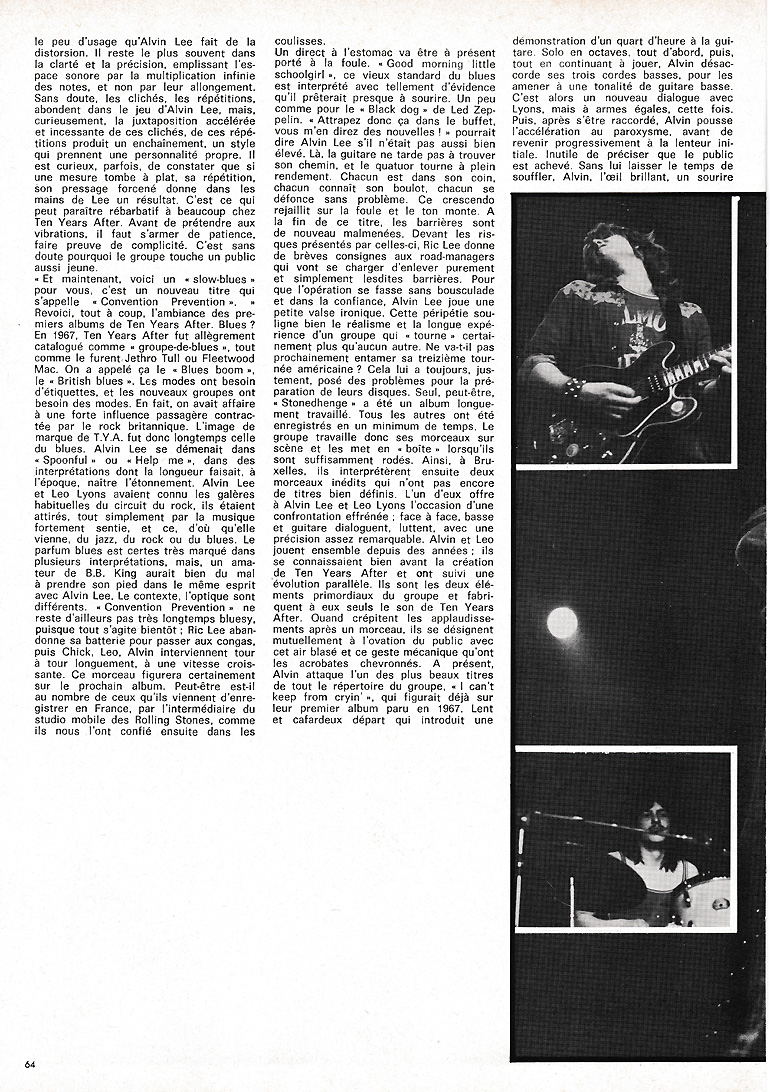
BEST -
page 64
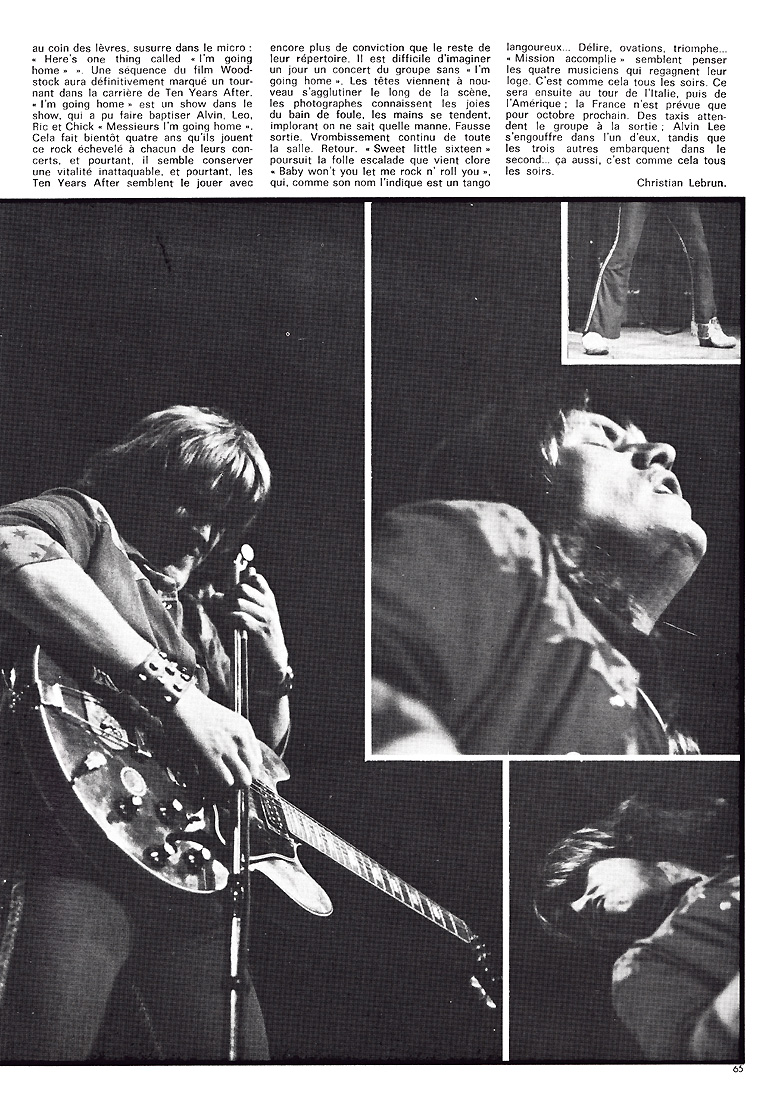
BEST -
page 65
1972 May, French
Magazine EXTRA, No. 18
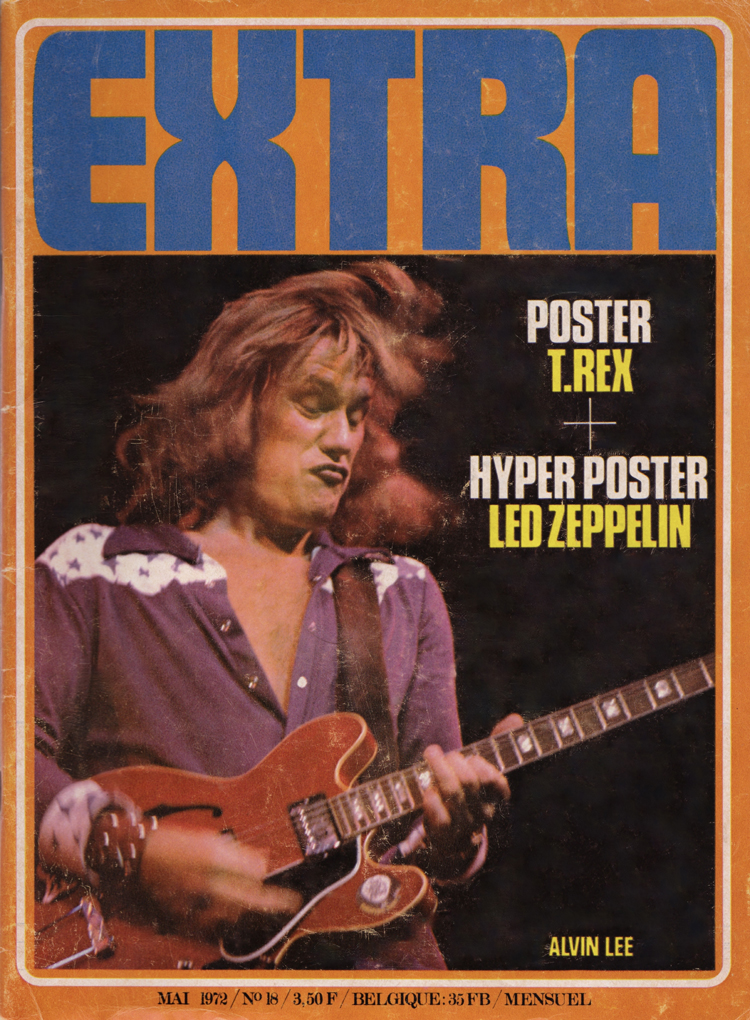
Photos: Claude
Gassian
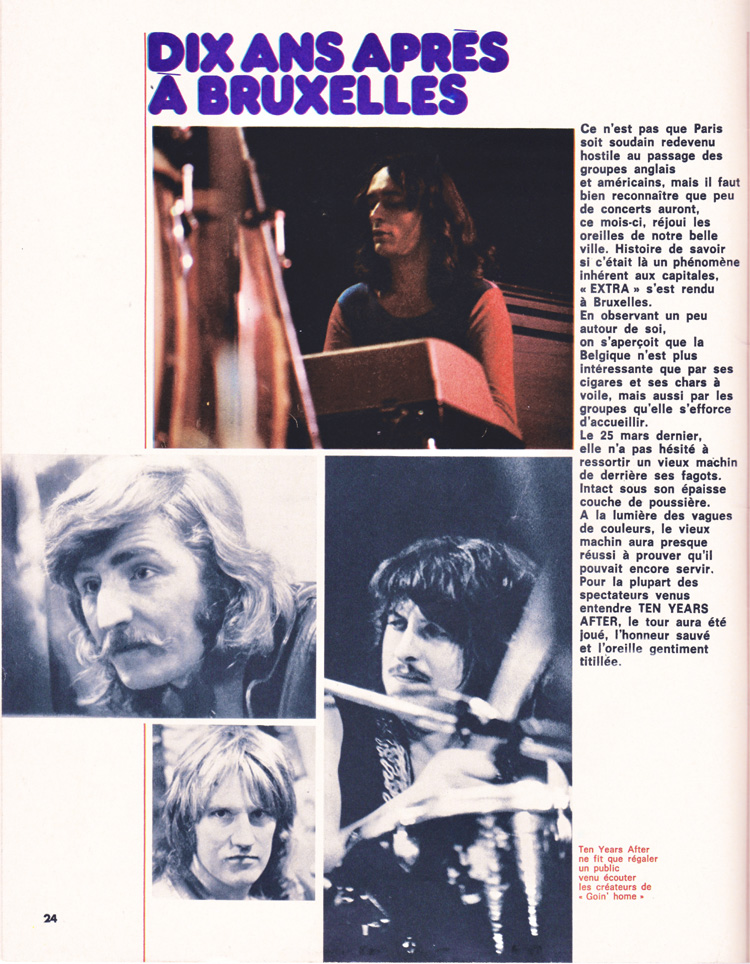
EXTRA -
page 24
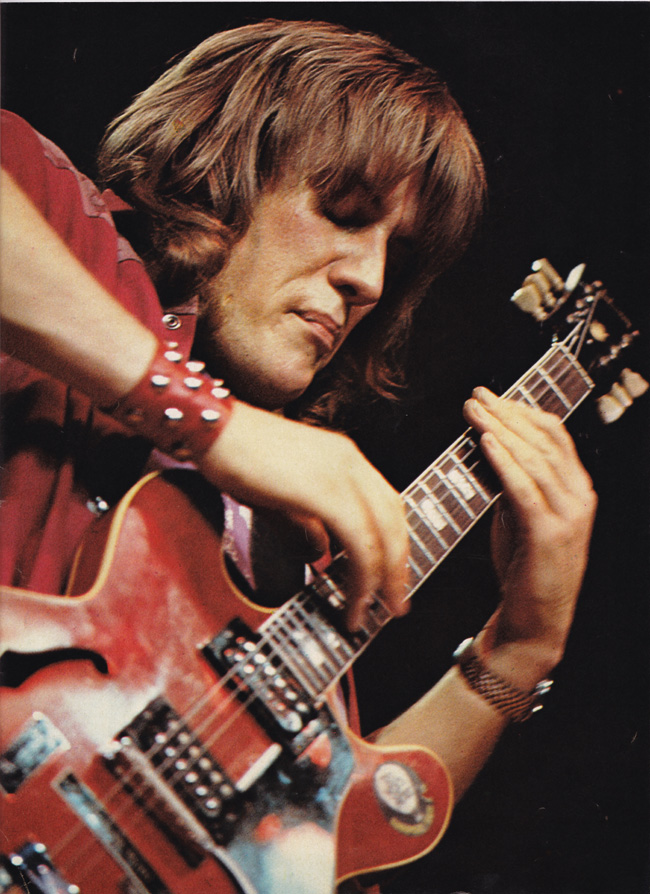
EXTRA -
page 25
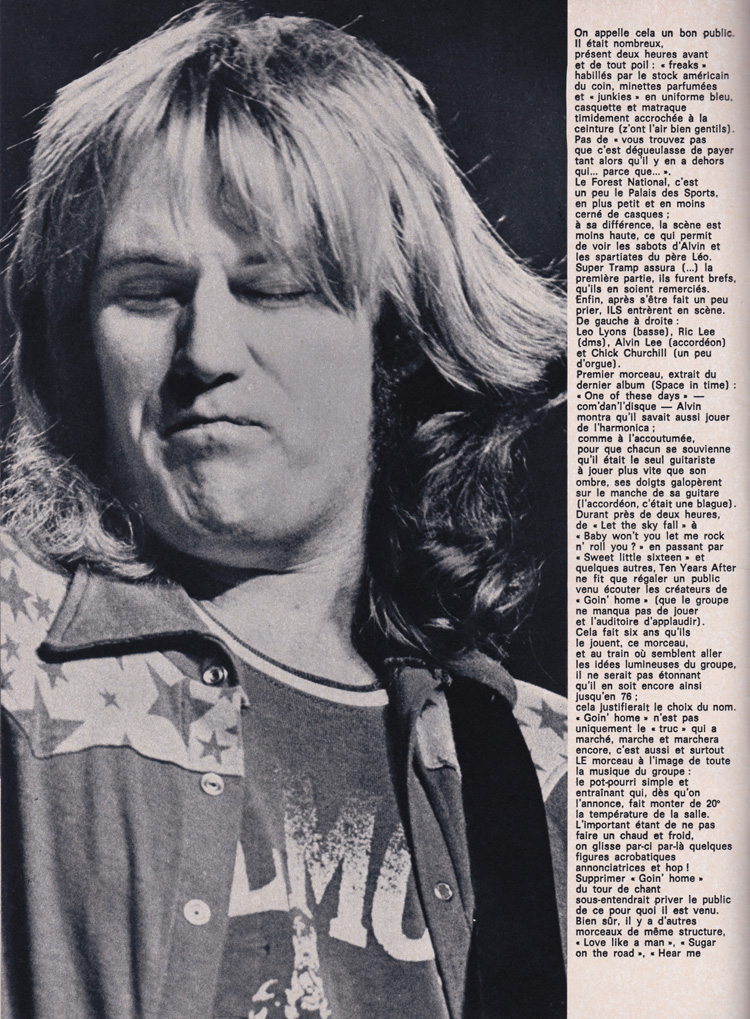
EXTRA -
page 26
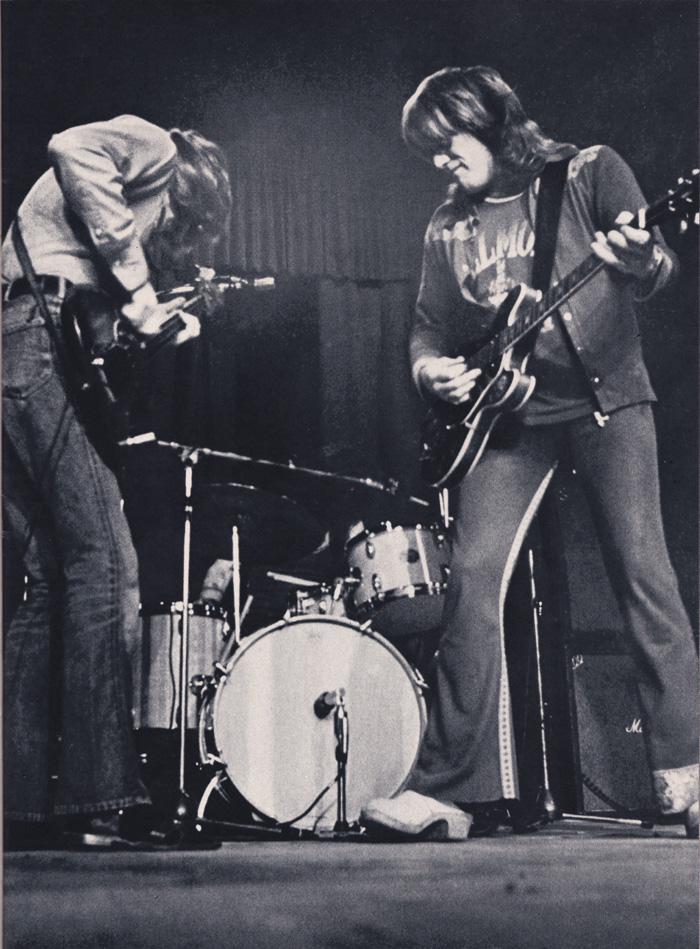
EXTRA -
page 27
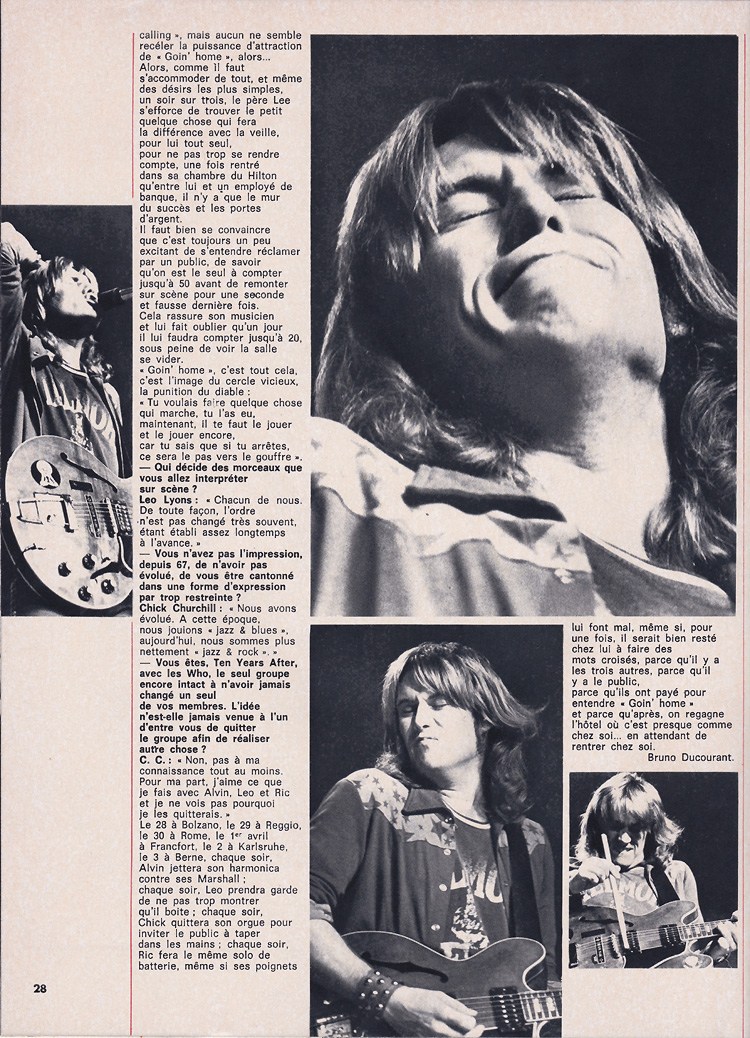
EXTRA -
page 28
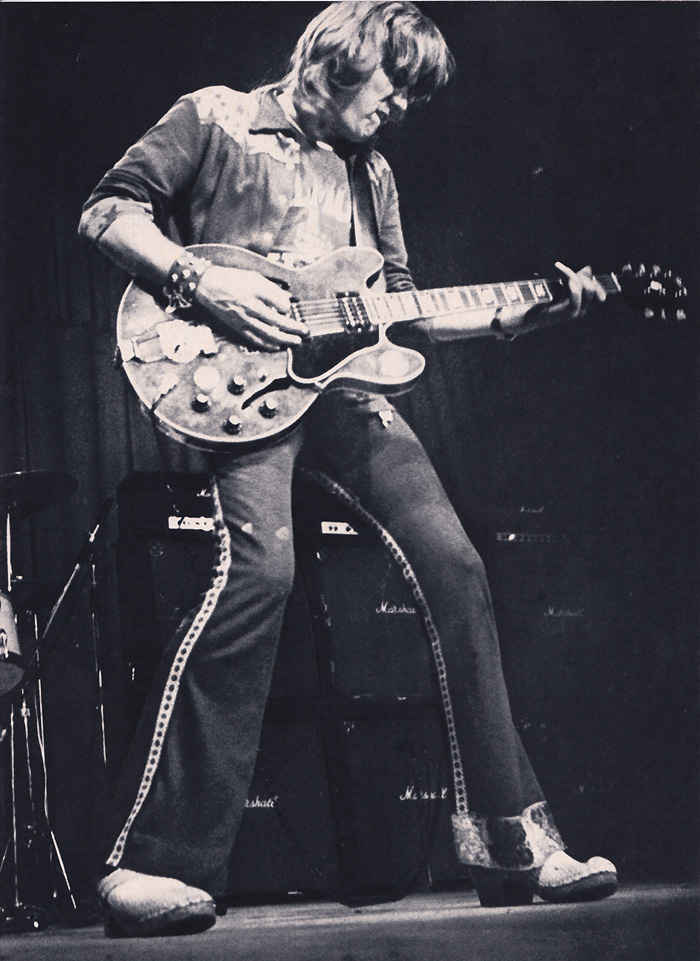
EXTRA -
page 29
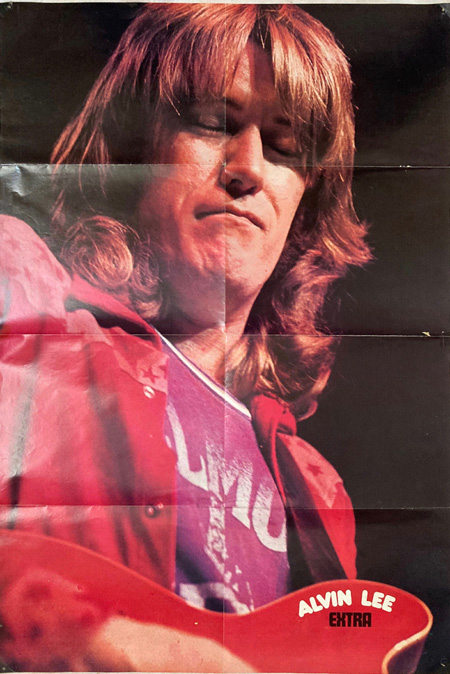
EXTRA -
Poster
|
TEN
YEARS AFTER - MEXICO
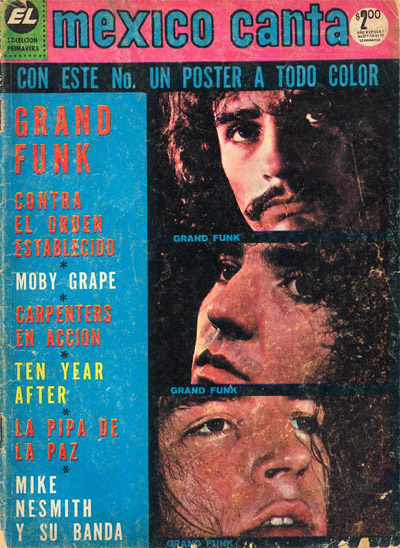
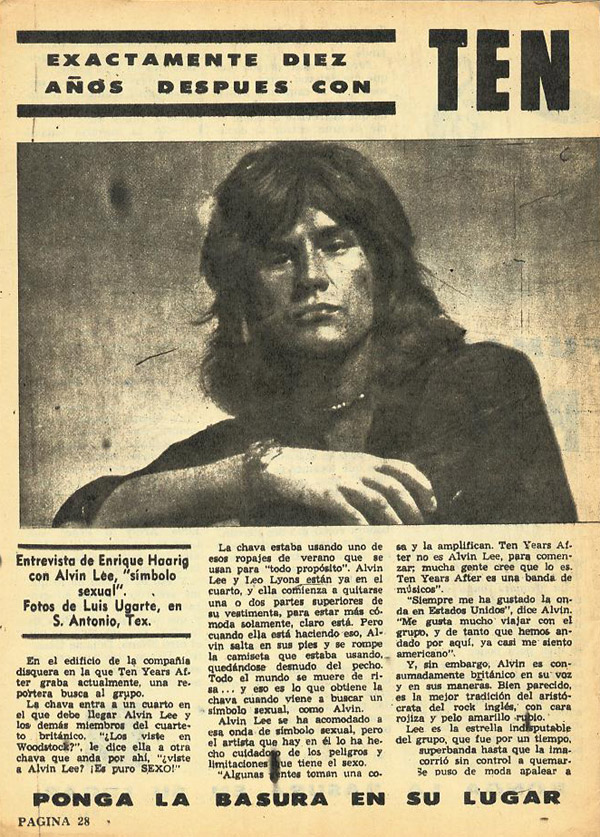
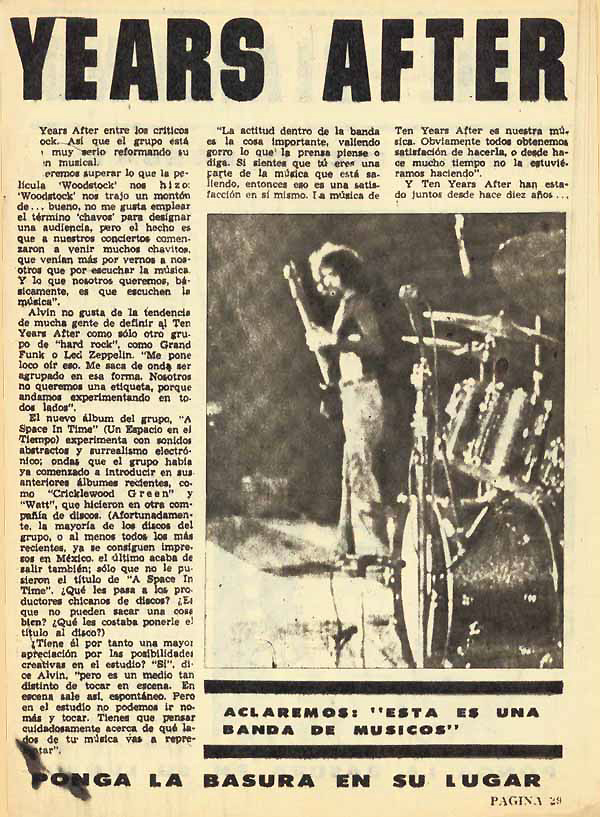
Mexico Canta No. 377 - 16-VI-72
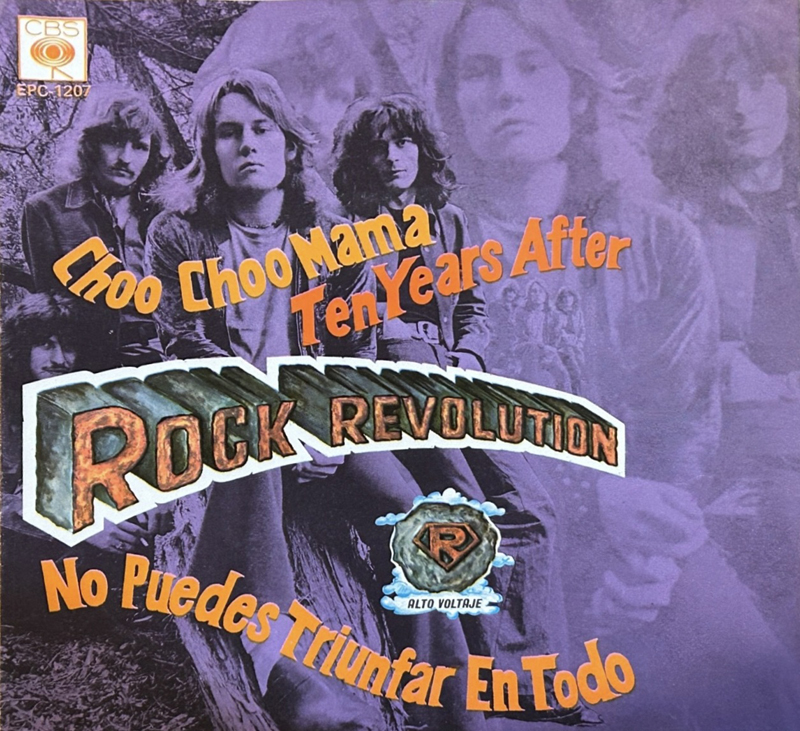
1972 - Single "Choo
Choo Mama" / "You Can't Win Them All" Edition
Mexico
|
|
|